本ホームページは「JavaScript」が使われております。 「JavaScript」をONにしてご利用ください。
Embassy of Japan in the United States of America

Visa and Travel Information

- If you need a visa, check how and when you can apply for a visa: General Rules & Processing Time
- If you do NOT need a visa, skip to STEP #6 .

Visa Information
Who needs a visa.
- The Visa Waiver Program applies based on your nationality, NOT on your U.S. residence status (including green card).
Back to Top
General Rules for Visa Application
Application procedure & processing time.
- In general, it takes 5 business days to issue a visa. (ex., If you apply on Monday, you can pick up a visa next Monday. Our holidays are not counted as business days.)
- It may take more than one month depending on the visa. We recommend that you apply for a visa approximately 1.5 months before your departure date. We do NOT have expedited services.

Types of Visas & Application Documents
- Please click on the applicable box below to see application documents on each visa.
- If you intend to stay in Japan more than 90 days, please click on the "COE Holders" box.
- The online application for a short-term tourism visa ( single entry only, and only for the purpose of tourism ) is available. For further information, please click on the “Short-term Tourism/Business/Study” box below.
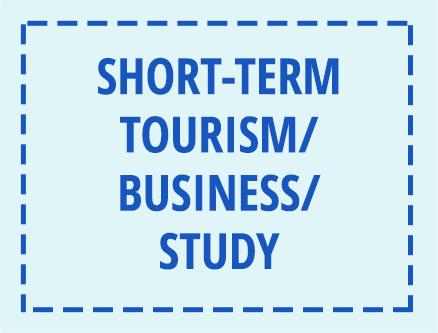
Application drop-off/pick-up & payment Hours
- No appointment required.
- No parking available.
- Please check our holidays before visiting.
- In case of adverse weather conditions, Embassy of Japan follows the guideline of U.S. Federal Government. When the U.S. Office of Personnel Management (OPM) announces federal agencies in the Washington, D.C. area are "closed" or "delayed", Embassy of Japan along with VISA section will be closed/delayed accordingly.
- The Embassy will NOT accept any applications by mail.
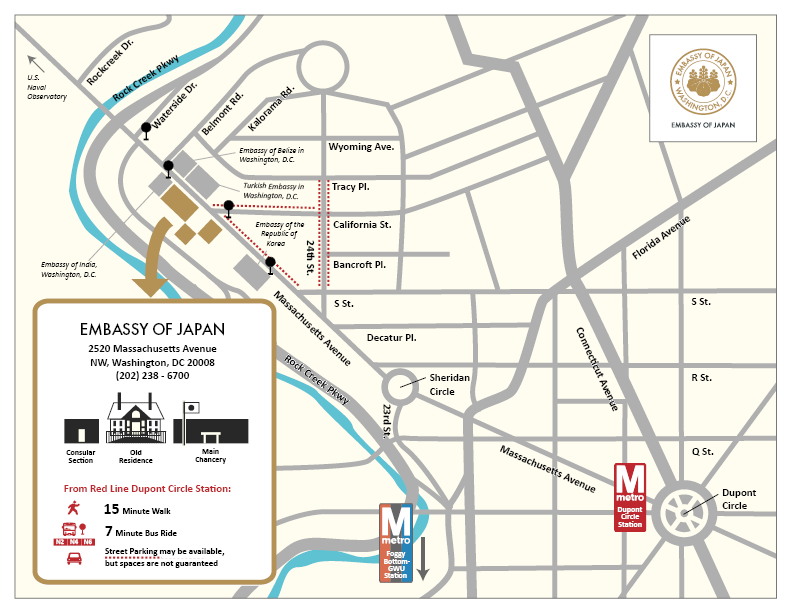
- US citizens are exempt from visa fees. (Some countries and regions are also exempt from visa fees. Please check the Visa Fee Exempt list to find out if your visa fee is waived. )
- Applicants who have applied for a visa online are required to bring a printed copy of “Registration Information Form” to the Embassy for your payment (payment is only acceptable in the afternoon). *Applicants who has applied for evisa (online visa) on or after 10th July are eligible for online payment ( Details / Video ).
- We accept CASH only. We DO NOT accept personal checks and credit cards.
Information on Border Measures
Covid-19 travel guidelines.
- On-arrival surveillance for travelers and returnees with COVID-19 symptoms has been conducted since 12:00 am (JST) on May 8, 2023.
- Insurance Before Entrance
- Guidebook for when you are feeling ill
Visiting Japan
- After April 29, 2023, pre-registration for quarantine procedures on Visit Japan Web are no longer required, however, you can still use Visit Japan Web to pre-register for "Immigration", "Customs" and "Tax-free Shopping Service" (Optional).
- For information about traveling with minor(s), please read our FAQ .

Staying in Japan
- Be aware of traffic rules in Japan
- Nice to Meet You! Let's Be Friends!
- Study in Japan
- Japanese pension law
- Information on Local Call Centers
- It is a CRIME to sell or give a bank account without just cause.
- Roadmap for the Realization of a Society of Harmonious Coexistence with Foreign Nationals
- Comprehensive Measures for Acceptance and Coexistence of Foreign Nationals
- A daily life support portal for foreign nationals
- Guidebook on Living and Working
- New to Japan? Useful pages for foreign nationals

Recommended Information
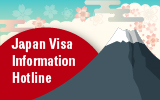
- Consular Section: Embassy of Japan, 2520 Massachusetts Ave. NW, Washington, DC 20008
- Office Hours: Application Drop-off/ M-F 9:15am-12:00pm Visa Pick-up/ M-F 1:30pm-4:00pm
- Contact Us: 202-238-6800/ M-F 9:00am-5:00pm
- Japan Visa Information Hotline (Available in English/Vietnamese/Russian/Ukrainian) 1-202-499-1468 Domestic call fee applies, 24hours, 7days/week
We’re sorry, this site is currently experiencing technical difficulties. Please try again in a few moments. Exception: request blocked
Visa Overview
* This hotline is designated for visa applicants residing in the U.S.A or Puerto Rico. * If you are calling from the U.S.A or Puerto Rico, you will be charged a domestic call fee for your call. * This Hotline will only provide general information regarding Japanese visas. * The Hotline will not connect you to the Consulate-General's visa section. If you need to contact the Consulate-General in regards to a pending visa application, please contact the Consulate-General directly at (212)888-0889 during office hours.
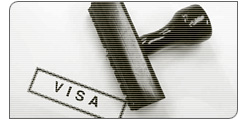
Categories of Visa
Before applying, visa applicants must first decide which kind of visa to apply for according to the purpose of their visit to Japan. The documentation required for application differs according to the kind of visa the applicant needs. Please check the link Types and Categories of Visa .
- Tours & Experiences
- Tailor-made Trips
- Bahasa Indonesia
We are happy to see you again!
Continue with
Or use email.
No Account? Create one
Create account
Already have an account? Sign in
Quickly Sign up with
I agree to Japan Travel's Terms of Service and Privacy Policy . Terms of--> and acknowledge that Japan Travel's Privacy--> applies to me.-->
Email reset password link
Please check your inbox and click the link we will send to you.
A Guide to Japanese Visas
A general overview of the Japanese visa system

Every foreign national entering Japan must possess a valid visa. Whether that visa is issued on arrival or applied for in advance is based on what type of "residence" the visitor is seeking.
Below is a brief introduction to some of the visa categories for visitors coming to Japan. For specific questions and more detailed information, it is always best to check with your local Japanese embassy/consulate or the immigration bureau in Japan.
Covid-19 is changing the travel landscape fast, including rules on temporary visas due to imposed restrictions. Check with your local Japanese embassy for the latest details, and follow our coronavirus updates .
Temporary Visitor Visa
Most visitors to Japan can enter the country on a temporary visitor visa, or tourist visa, thanks to visa exemption agreements between Japan and many foreign countries.
For residents of over 60 countries (a full list can be found here ), a fee-free 90-day visa is issued upon arrival. This requires no advance paperwork and amounts to being merely a landing permission stamp in the traveler’s passport. Visitors from a few select countries (including Thailand, Brunei and Indonesia) are permitted to enter Japan on a 15-day fee-free visa and 30 days for the United Arab Emirates
Visitors of certain nationalities (Austria, Germany, Ireland, Liechtenstein, Mexico, Switzerland or the United Kingdom) who enter Japan on a 90-day visa can extend their stay in the country by up to six months. Those interested in this option would need to apply for an extension—usually after the halfway mark of an existing visa—at the nearest immigration bureau in Japan.
Student Visa
Those who would like to attend university or language courses in Japan that last longer than 90 days should apply for a student visa.
Most universities and schools will be able to assist potential students with the application process. An application usually needs proof of enrollment at a host institution and evidence that a student can capably support themselves financially during the term of study.
Students who hope to seek part-time employment to supplement their savings while in Japan would have to apply for special permission from the local immigration bureau.
Most student visas are issued for a term of three months to just over 4 years. This can be extended if the student can prove he is still enrolled.
Working Holiday Visa
Citizens of 23 countries/regions (France, Germany, Austria, Slovakia, UK, Ireland, Portugal, Denmark, Norway, Taiwan, Hong Kong, South Korea, Canada, Australia, New Zealand, Poland, Hungary, Spain, Argentina, Chile, Iceland, Czech and Lithuania) can enter Japan on a working holiday visa.
This status allows visitors to pursue part-time work for up to a year in Japan. This visa is not intended for full-time positions, but rather for a series of short-term opportunities.
To apply for this program, visitors must be between the ages of 18 and 30 (both inclusive at the time of visa application) however the condition of age may be different depending on the applicant's issued country. They are required to hold citizenship in one of the aforementioned countries, and submit the following documents for consideration:
- Submit both the required form and a CV (resume)
- Supply proof that you possess sufficient funds to support yourself
- Register at the embassy of your home country upon arrival in Japan
More information can be found at the Ministry of Foreign Affairs Working Holiday official site and the Japan Association for Working Holiday Makers website (which also has a very useful job posting board).
Those who wish to engage in paid, full-time activities in Japan must enter the country with a valid work visa. Work visas are issued based on what area or field you will be working in during your time in Japan (i.e. journalism, business management, the arts, teaching, engineering, entertainment, etc). If you change jobs within Japan to a different field, it is necessary to apply for a different type of work visa.
Work visas are issued mostly to those who have either advanced degrees (university level or higher) or who possess a significant amount of experience in their field. It helps greatly to have a company "sponsor", showing that you have potential (or guaranteed) employment upon arrival.
Work visas are generally issued for a period ranging from four months to five years and are renewable.
In some cases it is possible to switch from another visa type to a work visa from within Japan if the applicant meets the required conditions — check the Application for Change of Status of Residence page on the Immigration Bureau of Japan website.
Other Visas
Several other visa categories exist that don't fall into the major categories above. These include the SOFA visa (for military members stationed in Japan or on orders), investor visa, and skilled foreign worker visa.
For more details on those visas, as well as the ones mentioned above, please contact your local Japanese consulate or see the Ministry of Foreign Affairs website for guidance. For information regarding Specified visas such as Spouse or Child of a Japanese national please check this page on the Ministry of Foreign Affairs website.
Contact Information
- Inquiries about visa examination status: Inquiries can be made only for cases in which the application documents have been transferred to the Ministry of Foreign Affairs in Tokyo from Japanese Embassies or Consulates where the visa application was initially lodged. Monday to Friday from 10:00-12:00 and 14:00-16:00.
- Other inquiries about visas: Monday to Friday from 09:00-12:30 and 13:30-17:00. Note: The automatic answering machine service is available only in Japanese (open 24 hours).
- Essential Guides
- Share on Facebook
- Share on Twitter
- Copy link to share
By Mandy Bartok
Community writer
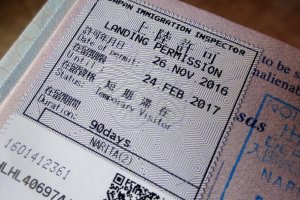
Information
03-5501-8431
Top Articles
- Recommended

Tokyo Named #1 City for Food and Drink

Sapporo Beer Opens New Brewery in Tokyo’s Ebisu

Valley of Witches: a New Ghibli Park Attraction

Tokyo One of the World's Most Walkable Cities

2024 Grand Sumo Tournaments

Mount Omuro

Haneda Airport Ranked World's Cleanest

Tokyo Takes 2nd Place on Top Coffee Cities List

Guide to Golden Week

Kurobe Unazuki Canyon Route to Link with Tateyama Kurobe Alpine Route

Guide to Bringing Medicines Into Japan

Your Name: Real-Life Locations in Tokyo

Hachiko Statue in Shibuya

Iwatayama Monkey Park

Daikoku Car Meet

Shibuya Crossing

Guide to Suica Cards

Japanese Urban Legends

Black Eggs of Owakudani, Hakone
More from this category, guide to bringing medicines into...
By Japan Travel
By Veronica Carnevale

Money in Japan
By Tom Roseveare

Getting a Tattoo in Japan
By Serena Ogawa
Join the discussion

Let us know how we can help.
Help us improve JapanTravel.com
We welcome any suggestions regarding this content. Your feedback is confidential and will be used to help improve this page.
Suggest an edit
https://en.japantravel.com/guide/japan-visa/34951
Thank you for your support!
Your feedback has been sent.
Entering Japan
Below is a basic introduction to the Japanese immigration system. Contact your closest Japanese embassy or consulate outside Japan or an immigration bureau inside Japan for official advice.
All foreigners, including foreign residents, get fingerprinted and photographed upon entering Japan as a measure aimed at preventing terrorism and other illegal activities. Excluded from this procedure are persons under the age of 16 and a few special groups, such as diplomats and visiting dignitaries.
All foreigners receive a status of residence when entering Japan. There are more than twenty statuses of residence, including "temporary visitor" for tourists, and a range of statuses for students , workers and relatives of Japanese nationals and residents.
If you are a citizen of one of the over 50 countries with which Japan has a "general visa exemption arrangement", you need only a valid passport to enter Japan as a "temporary visitor". Otherwise, you need to obtain a visa before entering the country. Temporary visitors from most countries are allowed to stay for up to 90 days.
If you are a citizen of Austria, Germany, Ireland, Liechtenstein, Mexico, Switzerland or the United Kingdom, you have the possibility to extend your stay to a total of up to six months. You still initially enter Japan on a 90 day permit, but can then apply for an extension at an immigration bureau in Japan.
Visitors to Japan are encouraged to use Visit Japan Web to digitally submit immigration and customs-related information ahead of their arrival for a smoother entry into the country without the need to fill out paper forms. The system can be used to also create a tax exemption QR code for an enhanced tax-free shopping experience.
Temporary visitors are not allowed to engage in any paid activities. However, short term studies at Japanese language schools are permitted.
All foreign tourists in Japan are required to carry their passports with them at all times.
Longer stays for the wealthy and digital nomads
If you are a citizen of one of the over 50 countries with which Japan has a "general visa exemption arrangement" and have savings of over 30 million yen, you and your spouse may qualify to stay in Japan for up to one year for the purpose of sightseeing and recreation. Likewise, professionals with an annual income of over 10 million yen may qualify to work remotely from Japan for up to six months. Respective visas (for "long-term residents for sightseeing/recreation" or "digital nomads") have to be obtained before traveling to Japan.
White-collar work
Foreigners who wish to work in Japan need to get a work visa from a Japanese embassy or consulate outside of Japan to enter the country on a status of residence permitting work.
There are over a dozen such statuses of residence, each allowing the holder to work only in a specific professional field, for example, journalism, arts, research, education, engineering, entertainment, business management, international services, etc. If you change jobs while you are in Japan and your new job falls into a different professional field (e.g. from education to engineering), you will need to change your status of residence.
A university degree or considerable professional experience in the applicable field is required to qualify for most work visa types. Most also require you to have a prospective employer as a sponsor. Residence permission is granted in periods of 4 months to 5 years and is extendable.
Workers may bring their spouses and children to Japan on a dependent visa. Dependents are not allowed to engage in any paid activities unless they get permission from the immigration office, but even then, they may work only a set maximum number of hours per week.
Other work and trainees
The so-called "Specified Skills" status allows for work in one of over a dozen professional fields, including construction, hospitality, nursing and manufacturing. Applicants do not need a degree but have to pass a technical skills test and know some Japanese. There are two types: Type 1 allows workers to stay in Japan for up to five years, but they may not bring their family. Type 2 is for more highly qualified workers, can be extended indefinitely and allows for the family to live in Japan. Type 1 holders may upgrade to type 2 after five years.
Furthermore, there is the "Technical Intern Training Program", which lets foreign workers acquire skills at a workplace in Japan that they could not otherwise acquire in their home countries. After a few years, participants become eligible to switch to the above-mentioned "Specified Skill" type 1 status. Most trainees come from South East Asia.
Working holidays
This is a special visa type that allows some paid activity for citizens of Australia, Canada, Denmark, Germany, France, Ireland, Korea, New Zealand, the United Kingdom and a few other countries between the ages of 18 and 30. Consult the working holiday visa page for details.
Foreigners who wish to study in Japan (except for short term studies at language schools ) need to get a student visa at a Japanese embassy or consulate outside of Japan in order to enter the country on a status of residence that permits long term studies.
Sponsorship from an educational institution in Japan and proof of sufficient funds to cover all your expenses during your stay are required to qualify for a student visa. Residence permission is granted in periods of between 3 months and 4 years and 3 months and is extendable.
Students must not engage in paid activities unless they get permission from the immigration office. Even then, students may work only a set maximum number of hours per week.
Foreigners who are married to a Japanese national or to a permanent resident of Japan can obtain a spouse visa, which allows them to engage in any paid activity in Japan. Residence permission is granted in periods of 6 months or 1, 3 or 5 years and is extendable.
Staying in Japan
Inside Japan, most immigration-related matters, such as extending residence permission or changing the status of residence, are handled by the Immigration Services Agency, which has bureaus across the country.
Residence card
All new foreign residents are issued a residence card upon initially entering Japan at Narita , Haneda , Kansai or Chubu airports. New residents arriving through different ports can get their cards at their municipal offices.
The residence card is an important document required for opening a bank account , obtaining a cell phone , converting a drivers license and similar activities. It stores the holder's personal information, including the current address, the status of residence and period of stay. Foreign residents are required to carry their residence card with them at all times.
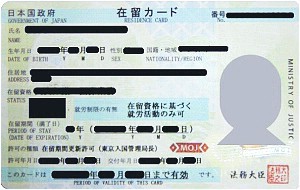
Extending residence permission
Most statuses of residence allow you to stay in Japan for a period between three months and five years. If you wish to stay longer, you must apply for an extension at an immigration bureau inside Japan before the expiry date of your current residence permission.
The application process is relatively simple, provided that you still fulfill the conditions for the specific status of residence. It typically takes a couple of days or weeks for the application to be processed, and you are allowed to remain in Japan during that time even if your previous residence permission expires in the meantime.
Changing status of residence
It is possible to change your status of residence (e.g. from instructor to arts or from student to engineer) at an immigration bureau inside Japan. You will have to provide similar documentation as you would when applying for a new status of residence at an embassy or consulate outside of Japan.
Re-entry permits
Foreign residents who wish to temporarily leave Japan for longer than a year, need to get a re-entry permit before departing Japan; otherwise, they lose their status of residence. Re-entry permits can be obtained at immigration offices in Japan. For absences of less than one year, re-entry permits are not required.
Permanent residence
Foreign residents, who have shown good conduct and have sufficient assets or ability to make an independent living, can be granted permanent residence if they reside in Japan for a certain number of consecutive years. For highly-skilled professionals and spouses of Japanese nationals, the minimum amount of years is typically one to five years, while for others it is typically ten years. Permanent residence status is indefinite and allows for any paid activity.
Naturalization
Foreigners, who have resided in Japan for at least five consecutive years (less if married to a Japanese national), have shown good conduct, have never plotted against the Japanese government, have sufficient assets or ability to make an independent living and are willing to renounce any other citizenship held, can be granted Japanese citizenship.
Questions? Ask in our forum .
Links and Resources
A guide to japanese visas, japan customs, guide to the animal quarantine service, the ministry of foreign affairs, immigration services agency of japan.

- About Japan
Visiting Japan
- Information Related to COVID-19 - JapanGov
- Border enforcement measures to prevent the spread of novel coronavirus (COVID-19) - Ministry of Foreign Affairs of Japan
- TeCOT (COVID-19 Testing Center for Overseas Travelers) - Ministry of Economy, Trade and Industry
- Vaccination Certificate for Overseas Travel - Ministry of Health, Labour and Welfare
- Novel Coronavirus (COVID-19) - Ministry of Health, Labour and Welfare
- Coronavirus (COVID-19) advisory information - Japan National Tourism Organization
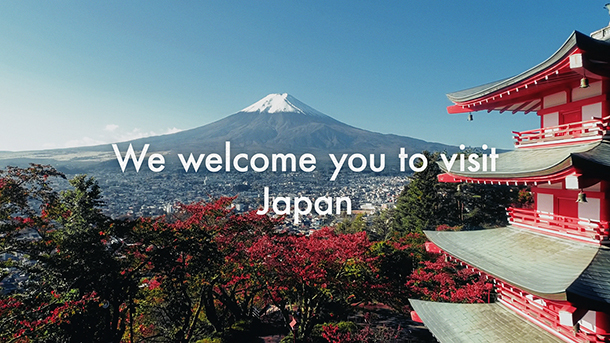
We welcome you to visit Japan
Empowering the Disabled
This movie introduces the new essential steps ahead of an unforgettable travel in Japan.
General Information
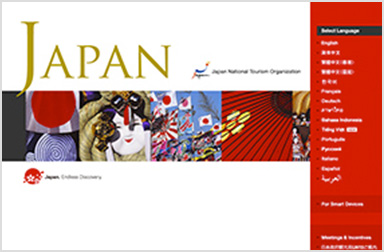
Japan: the Official Guide
Japan National Tourism Organization
General tourism information of Japan in multi languages. Climate, Healthcare, Money, Visa, Emergency info, etc. WEB: http://www.jnto.go.jp/

Open for Professionals
Japan External Trade Organization
The Government of Japan strongly welcomes highly-skilled foreign professionals. WEB: https://www.jetro.go.jp/en/hrportal/
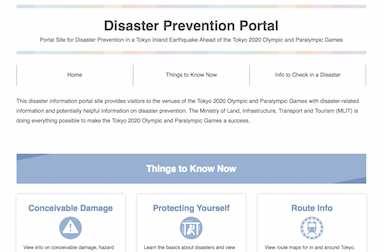
Disaster Prevention Portal
Ministry of Land, Infrastructure, Transport and Tourism
Portal Site for Disaster Prevention in a Tokyo Inland Earthquake Ahead of the Tokyo 2020 Olympic and Paralympic Games. WEB: http://www.mlit.go.jp/en/
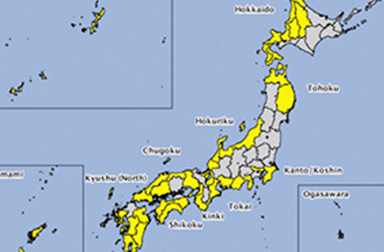
Safety Tips
Safety tips is an app to push notify the disaster information of Japan. Download the app from the website as follow; WEB: http://www.jnto.go.jp/safety-tips/
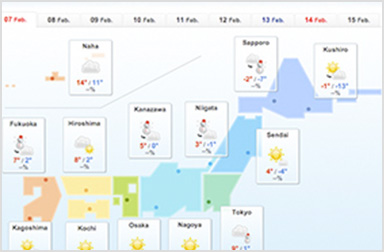
Japan Weather Forecast for Travelers
Weather forecast in English for travelers. WEB: http://www.jnto.go.jp/weather/eng/index.php
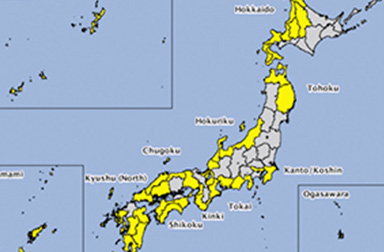
Japan Meteorological Agency
WEB: http://www.jma.go.jp/jma/indexe.html
Embassies, Visas, Customs and other Tourism Related Information
- Japanese Embassies, Consulates and Permanent Missions Overseas [Ministry of Foreign Affairs]
- Visas – Guide to Japanese Visas – [Ministry of Foreign Affairs]
- Customs – Procedures of Passenger Clearance – [Japan Customs]
- The Working Holiday Programmes in Japan [Ministry of Foreign Affairs]
- Animal Quarantine [Ministry of Agriculture, Forestry and Fisheries]
- Plant Protection Station [Ministry of Agriculture, Forestry and Fisheries]
Studying and Teaching
- Study in Japan Comprehensive Guide [Ministry of Foreign Affairs]
- Gateway to study in Japan [Japan Student Services Organization]
- Erin's Challenge! I can speak Japanese [The Japan Foundation]
- Marugoto: Japanese Language and Culture [The Japan Foundation]
- Portal Site on Policies for Foreign Residents [Cabinet Office]
- The Japan Exchange and Teaching Programme (JET)
- Application
- Requirements
Japan Visa Requirements
Entry requirements for japan, choose your nationality.
Japan has visa exemption agreements with 68 countries . Travelers from several countries in Latin America, Africa, and Asia as well as many former Soviet Union nations are required to obtain a visa to Japan .
There are a few entry requirements for Japan that must be considered when planning a trip to the country.
Japan Entry Visa Requirements
Foreign visitors who need a visa to travel to Japan must meet the following Japan tourist visa requirements .
- A valid passport with at least 6 months validity and 2 blank pages
- A completed and signed visa application form
- A recent photograph , size 4.5 x 4.5 cm, in color and with a white background
- An official birth certificate or a certified copy
- If the traveler is married, it is necessary to submit a marriage certificate issued within one year
- Schedule and travel plans in Japan

Visitors who are required to apply for a Japan visa should verify that they meet all the necessary requirements . It is essential to have a valid passport and complete the visa application form with the details exactly as they are on the passport.
The period of time to stay in Japan is differs from 15 days to 90 days, depending on the nationality of the passport traveler. All the other travelers are required to visit the nearest Japanese diplomatic mission and apply for a visa before departure.
Citizens of the following countries are required a tourist visa for Japan:
- Central African Republic
- Cote D'Ivoire
- Congo, The Democratic Republic of the
- Marshall Islands
- Moldova, Republic of
- Palestinian Territory
- Russian Federation
- Saint Kitts and Nevis
- Saint Vincent and the Grenadines
- Solomon Islands
- Syrian Arab Republic
- Timor-Leste
Japan entry requirements for citizens from visa exempt countries require that travelers carry a passport, valid for at least the proposed duration of their stay.
Other Requirements to visit Japan
There are some additional Japan visa requirements that foreign travelers need to take into account when submitting their application at a Japanese mission.
Some travelers have a sponsor or guarantor that will support the Japan visa application. A sponsor is a person that, under the visa conditions, will cover the expenses of the person applying for a visa.
If the traveler does not have a sponsor or guarantor for their trip to Japan it is necessary to demonstrate that they can cover the expenses of their stay. In order to do this, it is necessary to submit the following:
- Bank certificate, issued within the last 3 months
- Applicant’s income tax return
In the case that the traveler has a sponsor or guarantor it is necessary to provide:
- Guarantee letter where the relation between the traveler and the sponsor is explained and the details of the sponsor or guarantor must be included
- Proof of relationship with the guarantor
- Bank certificated and income tax return of the sponsor/guarantor
For questions or inquires about how to apply for a tourist visa to Japan, it is advised to contact the Japanese embassy or consulate.

Update April 12, 2024
Information for u.s. citizens in the middle east.
- Travel Advisories |
- Contact Us |
- MyTravelGov |
Find U.S. Embassies & Consulates
Travel.state.gov, congressional liaison, special issuance agency, u.s. passports, international travel, intercountry adoption, international parental child abduction, records and authentications, popular links, travel advisories, mytravelgov, stay connected, legal resources, legal information, info for u.s. law enforcement, replace or certify documents.
Before You Go
Learn About Your Destination
While Abroad
Emergencies
Share this page:
Travel Advisory January 8, 2024
Japan - level 1: exercise normal precautions.
Japan – Level 1: Exercise Normal Precautions
Reissued after periodic review without changes.
Exercise normal precautions in Japan.
Read the country information page for additional information on travel to Japan.
If you decide to travel to Japan:
- Enroll in the Smart Traveler Enrollment Program (STEP) to receive Alerts and make it easier to locate you in an emergency.
- Follow the Department of State on Facebook and Twitter .
- Follow Embassy Tokyo’s American Citizen Services section on Facebook and Twitter .
- Review the Country Security Report for Japan.
- Visit the CDC page for the latest Travel Health Information related to your travel.
- Prepare a contingency plan for emergency situations. Review the Traveler’s Checklist .
Embassy Messages
View Alerts and Messages Archive
Quick Facts
Duration of intended period of stay. Please note you cannot travel on a passport you have previously declared as lost or stolen even if you subsequently locate it
One page required for entry stamp
Amounts equivalent to ¥1,000,000 or above subject to declaration
Embassies and Consulates
U.S. Embassy Tokyo 1-10-5 Akasaka, Minato-ku, Tokyo 107-8420 Japan Telephone: 81-3-3224-5000 Emergency After-Hours Telephone: 81-3-3224-5000 Fax: 81-3-3224-5856 Our Navigator Assistant will guide you to the information you need.
U.S. Consulate General Osaka-Kobe 2-11-5, Nishitenma, Kita-ku, Osaka 530-8543, Japan Telephone: 81-6-6315-5900 Emergency After-Hours Telephone: 81-3-3224-5000 Fax: 81-6-6315-5914 Our Navigator Assistant will guide you to the information you need.
U.S. Consulate General Naha 2-1-1 Toyama, Urasoe City, Okinawa, Japan Telephone: 81-98-876-4211 Emergency Telephone: 81-3-3224-5000 Fax: 81-98-876-4243 Our Navigator Assistant will guide you to the information you need.
U.S. Consulate General Sapporo Kita 1-jo Nishi 28-chome, Chuo-ku, Sapporo 064-0821, Japan Telephone: 81-11-641-1115 Emergency After-Hours Telephone: 81-11-641-1115 Fax: 81-11-643-1283 Our Navigator Assistant will guide you to the information you need. All assistance at the Consulate General Sapporo is by appointment only.
U.S. Consulate Fukuoka 5-26 Ohori 2-chome, Chuo-ku, Fukuoka 810-0052, Japan Telephone: 81-92-751-9331 Emergency After-Hours Telephone: 81-3-3224-5000 Fax: 81-92-713-9222 [email protected] Our Navigator Assistant will guide you to the information you need. Routine services are provided by appointment only.
U.S. Consulate Nagoya Nagoya International Center Bldg. 6th floor, 1-47-1 Nagono, Nakamura-ku, Nagoya 450-0001, Japan Telephone: 81-52-581-4501 Emergency After-Hours Telephone: 81-3-3224-5000 Fax: 81-52-581-3190 Our Navigator Assistant will guide you to the information you need. Emergency services are provided by U.S. Consulate General Osaka-Kobe.
Destination Description
See the Department of State’s Fact Sheet on Japan for information on U.S-Japan relations.
Entry, Exit and Visa Requirements
Visit the Embassy of Japan website for the most current visa information.
There are no COVID-related entry requirements for U.S. citizens.
Entry & Exit:
- You must have a valid passport and an onward/return ticket for tourist/business "visa free" stays of up to 90 days. Your passport must be valid for the entire time you are staying in Japan.
- You cannot work on a 90-day "visa free" entry.
- "Visa free" entry status may not be changed to another visa status without departing and then re-entering Japan with the appropriate visa, such as a spouse, work, or study visa.
- Visit the Embassy of Japan website for the most current information on all visa categories.
- Japanese immigration officers may deny you entry if you appear to have no visible means of support.
- All foreign nationals are required to provide fingerprint scans and to be photographed at the port of entry. Exceptions to this requirement include diplomatic and official visa holders, minors, and individuals covered under SOFA Article IX.2. For further information about landing procedures, please visit the Immigration Bureau of Japan’s website .
- Make sure your passport is valid. Note you cannot travel on a passport you have previously declared as lost or stolen even if you subsequently locate it. Japanese authorities will likely deny you entry into Japan if you attempt to do so. If you have reported your passport lost or stolen, you must apply for a new passport before travel.
Transiting Japan:
- Ensure that your passport and visa are valid and up-to-date before you leave the United States. Passport services are not available at the airport.
- Airlines in Japan may deny you boarding for transit if you do not have the required travel documents for an onward destination in another country or if your passport does not have six months of validity remaining. For the entry requirements of the country you are traveling to, visit the State Department's Country Specific Information website.
Military/SOFA Travelers: While active-duty U.S. military personnel may enter Japan under the Status of Forces Agreement (SOFA) with proper Department of Defense (DoD) identification and travel orders, all SOFA family members, civilian employees, and contractors must have valid passports to enter Japan. Please consult the DOD Foreign Clearance Guide before leaving the United States.
See the Immigration Bureau of Japan’s website for various immigration procedures.
HIV/AIDS Restrictions: The U.S. Department of State is unaware of any HIV/AIDS entry restrictions for visitors to or foreign residents of Japan.
Find information on dual nationality , prevention of international child abduction and customs regulations on our websites.
Safety and Security
For police services in Japan, dial 110. For fire or ambulance services, dial 119.
Crime: Crime against U.S. citizens in Japan is generally low and usually involves personal disputes, theft, or vandalism. In addition:
- Robberies committed after a victim has been drugged from a spiked drink can occur, especially in nightlife districts.
- Sexual assaults are not often reported, but they do occur, and victims may be randomly targeted. Victim's assistance resources or shelters are difficult for foreigners to access.
- Hate-related violent crimes rarely occur, although some U.S. citizens have reported being the target of discrimination because of their nationality or their race.
- Pick pocketing can occur in crowded shopping areas, on trains, and at airports.
- Police reports must be filed before leaving Japan, as Japanese police will not accept reports filed from overseas.
- In instances involving credit card theft or fraud, Japanese police often provide a report number rather than a police report. You can provide this report number to your credit card company to confirm the incident with the police.
Entertainment and Nightlife Districts in Tokyo:
- Exercise caution in all entertainment and nightlife districts throughout Japan, especially Roppongi, Kabuki-cho, Shibuya, and Ikebukuro.
- Incidents involving U.S. citizens in these areas include physical and sexual assaults, drug overdoses, theft of purses, wallets, cash and credit cards at bars or clubs, and drugs slipped into drinks.
- Drink spiking at bars and entertainment venues, especially in areas such as Roppongi and Kabuki-cho, near Shinjuku, has led to robbery, physical and sexual assaults, and credit card fraud. Some victims regain consciousness in the bar or club; other victims may awaken on the street or other unfamiliar locations.
- U.S. citizens have reported being threatened with gun or knife violence in such venues so that they will pay exorbitant bar tabs or withdraw money. U.S. citizens have also reported being beaten when they have refused to pay or hand over money.
- There have been reports of U.S. citizens being forcibly taken to ATMs and robbed, or made to withdraw funds after being unable to pay exorbitant bar tabs.
- Please be aware that Roppongi, Kabuki-cho, and other entertainment and nightlife districts have also been the scenes of violence between criminal syndicates.
See the Department of State and the FBI pages for information on scams.
Police reports must be filed at the nearest police station prior to departure from Japan. The Japanese police cannot accept reports filed from overseas. Report crimes to the local police at 110 and contact the U.S. Embassy at 03-3224-5000 (011-81-3-3224-5000 from overseas). Remember that local authorities are responsible for investigating and prosecuting the crime.
See our webpage on help for U.S. victims of crime overseas .
- help you find appropriate medical care;
- assist you in reporting a crime to the police;
- contact relatives or friends with your written consent;
- explain the local criminal justice process in general terms;
- provide a list of local attorneys;
- provide information on victim’s compensation programs in the U.S. ;
- provide an emergency loan for repatriation to the United States and/or limited medical support in cases of destitution
- help you find accommodation and arrange flights home; and/or
- replace a stolen or lost passport.
Contacting Police, Fire and Ambulance Services: You can reach the police throughout Japan by dialing 110. Fire and ambulance services can be contacted by dialing 119. Note that English-speaking dispatchers may not be available. Please review advice on “Calling for Help” on our website . If you need assistance, you should be able to describe your address/location in Japanese or find someone who can do so, since few police officers speak English.
Domestic Violence: Victim's assistance resources or battered women's shelters exist in major urban areas, but are difficult for foreigners to access. These types of resources are also generally unavailable in rural areas. Investigations of sexual assault crimes are often conducted without female police officers present, and police typically ask about the victim's sexual history and previous relationships.
Tourism: The Victim's assistance resources or battered women's shelters exist in major urban areas, but are difficult for foreigners to access. These types of resources are also generally unavailable in rural areas. Investigations of sexual assault crimes are often conducted without female police officers present, and police typically ask about the victim's sexual history and previous relationships.
See our webpage for more information on insurance providers for overseas coverage.
Local Laws & Special Circumstances
Criminal Penalties: You are subject to Japanese law while you are in Japan. If you violate Japanese laws, even unknowingly, you may be arrested, imprisoned, or deported. If you are arrested in Japan, even for a minor offense , you may be held in detention without bail for several months or more during the investigation and legal proceedings.
Some offences are also prosecutable in the United States, regardless of Japanese law. For examples, see our website on crimes against minors abroad and the Department of Justice website.
The vast majority of arrests of U.S. citizens in Japan are for drug-related offenses. Japanese authorities aggressively pursue drug smugglers and users, including recreational users with sophisticated detection equipment, "sniffing" dogs, blood tests, “stop and frisk” tactics, and other methods. Penalties for possessing, using, or trafficking a drug that is illegal in Japan are severe, and convicted offenders can expect long jail sentences and fines. Please note that some drugs which may be legal in certain jurisdictions outside of Japan, including marijuana and synthetic drugs, remain illegal in Japan. This also applies to certain prescription drugs that doctors in the United States may prescribe. Japanese law makes no distinction between medical and recreational marijuana; therefore, having a prescription for medical marijuana will not help you avoid arrest or prosecution. Even possession of a small amount of marijuana for personal medical or recreational use can result in a long jail sentence and fine. Japanese customs officials carefully screen incoming packages, and individuals who are mailed drugs can be arrested and prosecuted as drug traffickers.
Confiscation of Prescription Drugs and Other Medication: It is important to note that some medications that are routinely prescribed in the United States, including Adderall and marijuana, are strictly prohibited in Japan. The Japanese government decides which medications may be imported legally into Japan. The Embassy and Consulates of Japan in the United States have limited information available and do not have a comprehensive list of specific medications or ingredients. Please see more information on importing medicines into Japan.
You must carry your U.S. passport or Japanese Residence Card (Zairyu Kado) with you at all times. In Japan, you may be taken in for questioning if you do not have your passport or Japanese residence card to show your identity and status in Japan (e.g., as a visitor, student, worker, or permanent resident).
It is illegal to work in Japan while in tourist or visa-waiver status. Overstaying your visa or working illegally may lead to fines of several thousands of dollars, and in some cases, re-entry bans as long as 10 years, or indefinitely for drug offenders. For additional information, please see Japan’s Immigration Control and Refugee Recognition Act and contact the Japanese Embassy or nearest Japanese Consulate in the United States for more information.
Driving under the influence of alcohol could also land you immediately in jail. The blood-alcohol limit in Japan is 0.03%. Punishments can be up to 10,000 USD in fines and up to five years in prison.
Possession of a gun or ammunition is a crime in Japan. Carrying a knife with a locking blade, or a folding blade that is longer than 5.5 cm (a little more than two inches), is illegal in Japan. U.S. citizens and U.S. military personnel have been arrested and detained for more than 10 days for carrying pocket knives that are legal in the United States but illegal in Japan. The possession of lock-picking tools is illegal in Japan.
Establishing a Business : Individuals establishing a business or practicing a profession that requires additional permits or licensing should seek information from the competent local authorities, prior to practicing or operating a business.
A list of English-speaking lawyers located throughout Japan is available on our website .
Arrest Notification : If you are arrested or detained, ask police or prison officials to notify the U.S. Embassy immediately. See the Department of State’s webpage and the Embassy’s website for additional information.
Counterfeit and Pirated Goods: Although counterfeit and pirated goods are prevalent in many countries, they may still be illegal according to local laws. You may also pay fines or have to give them up if you bring them back to the United States. See the U.S. Department of Justice’s website for more information .
Faith-Based Travelers: See our following webpages for details:
- Faith-Based Travel Information
- International Religious Freedom Report – see country reports
- Human Rights Report – see country reports
- Hajj Fact Sheet for Travelers
- Best Practices for Volunteering Abroad
LGBTQI+ Travelers: There are no legal restrictions on same-sex sexual relations or the organization of LGBTI+ events in Japan.
Laws governing rape, sexual commerce, and other activity involving sexual relations do not apply to same-sex sexual activity. This leads to lower penalties for perpetrators of same-sex rape and sexual assault and greater legal ambiguity surrounding same-sex prostitution.
See our LGBTQI+ Travel Information page and section 6 of our Human Rights report for further details.
Travelers with Disabilities: The law in Japan prohibits discrimination against persons with disabilities. Japanese disability laws require the public sector to provide reasonable accommodations and the private sector to make best efforts in employment, education, access to health care, or the provision of other services; however, there are no penalties for noncompliance. Social acceptance of persons with disabilities in public is not as prevalent as in the United States.
Although Japan’s accessibility laws mandate that new construction projects for public use include provisions for persons with disabilities, older buildings are not likely to have been retrofitted for accessibility. At major train stations, airports, and hotels, travelers with disabilities should encounter few accessibility problems. Note that many smaller stations are inaccessible to those who cannot climb stairs. Information on travel in Japan for travelers with disabilities is available at Accessible Japan .
Travelers with disabilities can learn more about resources available in country from the Japan National Tourism Organization’s traveling with a disability page .
Students: See our Students Abroad page and FBI travel tips .
Women Travelers: See our travel tips for Women Travelers .
Conditions at Prisons and Detention Facilities: Japanese prisons and detention facilities maintain internal order through a regime of very strict discipline. U.S. citizen prisoners often complain of stark, austere living conditions and psychological isolation. Heating in winter can be inadequate in some facilities, food portions can be significantly smaller than what many may be accustomed to, and access to specialized medical care, particularly mental health care, at detention facilities and prisons is sometimes limited. Additional information on arrests in Japan is available on our embassy website.
Customs Regulations: Please contact the Japanese Embassy or nearest Japanese consulate in the United States, or visit the Japanese Customs website for specific information regarding import restrictions and customs requirements.
Japanese customs authorities encourage the use of an Admission Temporaire/Temporary Admission (ATA) Carnet in order to temporarily import professional equipment, commercial samples, and/or goods for exhibitions and trade fairs into Japan. For additional information, please call (212) 354-4480, or email the U.S. CIB for details.
Pets: The Japanese Animal Quarantine Service (AQS) sets procedures for importing pets. At a minimum, the process will take seven to eight months, though the process can take up to a year before a pet may enter Japan. Advance planning is critical. You can find more information about importing a pet into Japan or information about exporting a pet from Japan on our Embassy website.
Employment Issues: U.S. citizens should not come to Japan to work without having the proper employment visa arranged ahead of time. Teaching English, even privately, and serving as hosts/hostesses are both considered "work" in Japan and are illegal without the proper visa.
Some U.S.-based employment agencies and Japanese employers do not fully or correctly represent the true nature of employment terms and conditions. A minimum requirement for effectively seeking the protection of Japanese labor law is a written and signed work contract. If there is no signed contract, Japanese authorities are not able to act on behalf of foreign workers. If you are coming to Japan to work, carefully review your contract and the history and reputation of your Japanese employer before traveling to Japan. Complaints against U.S.-based employment agencies or recruiters may be directed to the Better Business Bureau or the Office of the Attorney General in the relevant state(s).
Disaster Preparedness : Japan is prone to natural disasters, including earthquakes, typhoons, tsunamis, and landslides. See the Embassy’s webpage for recommendations and steps you can take to prepare for an emergency. The Japan Tourism Organization’s Safety Tips app and NHK World app provide Japanese government emergency “J-Alerts” to your cell phone in English through push notifications. “J-Alerts” can provide early warning emergency alerts on earthquakes predicted in a specific area, sometimes seconds before an earthquake hits.
Radiation: Fukushima Daiichi Nuclear Power Plant : The Government of Japan continues to closely monitor the conditions at and around the Fukushima Daiichi Nuclear Power Plant. You should comply with all travel restrictions and cautions put into place by the Government of Japan for areas surrounding the plant. For more information, contact the Japan Nuclear Regulation Authority .
For police service in Japan, dial 110. For fire or ambulance, dial 119.
Ambulance services are widely available but receiving hospitals may decline to accept inbound patients unless they can provide proof of funds to pay for services.
COVID-19 Testing:
- Travelers should contact Japanese local health providers to determine the location of testing facilities within Japan. A non-comprehensive list of some COVID-19 testing facilities can be found here on the Embassy website.
COVID-19 Vaccines:
- The COVID-19 vaccine is available for U.S. citizens to receive in Japan.
- Review the Government of Japan’s English language website on COVID-19 vaccinations in Japan.
- Visit the FDA's website to learn more about FDA-approved vaccines in the United States.
The Department of State does not pay medical bills. Be aware that U.S. Medicare/Medicaid does not apply overseas. Most hospitals and doctors overseas do not accept U.S. health insurance.
Medical Insurance: Make sure your health insurance plan provides coverage overseas. Some care providers in Japan only accept cash payments. See our webpage for more information on insurance providers for overseas coverage. Visit the U.S. Centers for Disease Control and Prevention for more information on type of insurance you should consider before you travel overseas.
We strongly recommend supplemental insurance to cover medical evacuation.
If traveling with prescription medication, check with the government of Japan’s Ministry of Health website to ensure the medication is legal in Japan; possession, use, or importation of a prescription drug that is illegal in Japan may result in arrest and criminal prosecution. Always carry your prescription medication in original packaging with your doctor’s prescription. U.S. prescriptions are not honored in Japan, so if you need ongoing prescription medicine, you should arrive with a sufficient supply for your stay in Japan or enough until you are able to see a local care provider.
Vaccinations: Be up-to-date on all vaccinations recommended by the U.S. Centers for Disease Control and Prevention.
Further health information:
- World Health Organization
- U.S. Centers for Disease Control and Prevention (CDC)
Japan has a national health insurance system which is available only to those foreigners with long-term visas for Japan. National health insurance does not pay for medical evacuation. Medical caregivers in Japan may require payment in full at the time of treatment or concrete proof of ability to pay before they will treat a foreigner who is not a member of the national health insurance plan.
U.S.-style and standard psychological and psychiatric care can be difficult to locate outside of major urban centers in Japan and generally is not available outside of Japan's major cities. Extended psychiatric care can be very difficult to obtain.
Air Quality: Visit AirNow Department of State for information on air quality at U.S. Embassies and Consulates.
Travel and Transportation
Road Conditions and Safety : Driving in Japan can be complicated and expensive. Traffic moves on the left side of the road. Those who cannot read the language will have trouble understanding road signs. Highway tolls can be very high, and city traffic is often very congested. A 20-mile trip in the Tokyo area may take two hours. There is virtually no legal roadside or curbside parking; however, traffic is commonly blocked or partially blocked by those illegally parked curbside. In mountainous areas, roads are often closed during the winter, and cars should be equipped with tire chains. Roads in Japan are much narrower than those in the United States.
Traffic Laws : Japanese law provides that all drivers in Japan are held liable in the event of an accident, and assesses fault in an accident on all parties. Japanese compulsory insurance (JCI) is mandatory for all automobile owners and drivers in Japan. Most short-term visitors choose not to drive in Japan. Turning right or left on red lights is not permitted in Japan, and all passengers are required to fasten their seat belts.
Japan has a national 0.03 percent blood-alcohol-level standard for driving, and drivers stopped for driving under the influence of intoxicants will have their licenses confiscated. If you are found guilty of driving under the influence, speeding, or blatantly careless driving resulting in injury, you are subject to up to 15 years in prison.
See our Road Safety page for more information. The National Police Agency (NPA) oversees the administration and enforcement of traffic laws in Japan. You can find further information in English on the NPA English website . Information about roadside assistance, rules of the road, and obtaining a Japanese driver's license is available in English from the Japan Automobile Federation (JAF) web site . See the Japan National Tourism Organization’s website for car rental and driving in Japan.
Emergency Assistance : For roadside assistance, please contact the Japan Automobile Federation (JAF) at 03-5730-0111 in Tokyo, 072-645-0111 in Osaka, 011-857-8139 in Sapporo, 092-841-5000 in Fukuoka, or 098-877-9163 in Okinawa.
International Driving Permits (IDPs): An international driving permit (IDP) issued in the United States by the American Automobile Association (AAA) or the American Automobile Touring Alliance (AATA) is required of short-term visitors who drive in Japan. You must obtain an IDP issued in your country of residence prior to arriving in Japan. The U.S. Embassy andU.S. consulates do not issue IDPs. IDPs issued via the Internet and/or by other organizations are not valid in Japan.
Foreign residents in Japan who use an IDP may be fined or arrested. In practice, the term “resident” involves more than simply visa status or length of stay in Japan and is determined by the police. In short, a driver license from country outside Japan is not a substitute for a valid Japanese license for foreign residents. See the U.S. Embassy’s website for more information on driving in Japan.
Aviation Safety Oversight : The U.S. Federal Aviation Administration (FAA) has assessed the government of Japan’s Civil Aviation Authority as being in compliance with International Civil Aviation Organization (ICAO) aviation safety standards for oversight of Japan’s air carrier operations. Further information may be found on the FAA's safety assessment page .
Maritime Travel : Mariners planning travel to Japan should also check for U.S. maritime advisories and alerts in the Alerts section of the Embassy’s messages. Information may also be posted to the U.S. Coast Guard homeport website , and the National Geospatial-Intelligence Agency (NGA) broadcast warnings website portal select “broadcast warnings.”
For additional travel information
- Enroll in the Smart Traveler Enrollment Program (STEP) to receive security messages and make it easier to locate you in an emergency.
- Call us in Washington, D.C. at 1-888-407-4747 (toll-free in the United States and Canada) or 1-202-501-4444 (from all other countries) from 8:00 a.m. to 8:00 p.m., Eastern Standard Time, Monday through Friday (except U.S. federal holidays).
- See the State Department’s travel website for the Worldwide Caution and Travel Advisories .
- Follow us on Twitter and Facebook .
- See traveling safely abroad for useful travel tips.
Review information about International Parental Child Abduction in Japan . For additional IPCA-related information, please see the International Child Abduction Prevention and Return Act ( ICAPRA ) report.
Travel Advisory Levels
Assistance for u.s. citizens, learn about your destination, enroll in step.

Subscribe to get up-to-date safety and security information and help us reach you in an emergency abroad.
Recommended Web Browsers: Microsoft Edge or Google Chrome.
Make two copies of all of your travel documents in case of emergency, and leave one with a trusted friend or relative.
Afghanistan
Antigua and Barbuda
Bonaire, Sint Eustatius, and Saba
Bosnia and Herzegovina
British Virgin Islands
Burkina Faso
Burma (Myanmar)
Cayman Islands
Central African Republic
Cote d Ivoire
Curaçao
Czech Republic
Democratic Republic of the Congo
Dominican Republic
El Salvador
Equatorial Guinea
Eswatini (Swaziland)
Falkland Islands
France (includes Monaco)
French Guiana
French Polynesia
French West Indies
Guadeloupe, Martinique, Saint Martin, and Saint Barthélemy (French West Indies)
Guinea-Bissau
Isle of Man
Israel, The West Bank and Gaza
Liechtenstein
Marshall Islands
Netherlands
New Caledonia
New Zealand
North Korea (Democratic People's Republic of Korea)
Papua New Guinea
Philippines
Republic of North Macedonia
Republic of the Congo
Saint Kitts and Nevis
Saint Lucia
Saint Vincent and the Grenadines
Sao Tome and Principe
Saudi Arabia
Sierra Leone
Sint Maarten
Solomon Islands
South Africa
South Korea
South Sudan
Switzerland
The Bahamas
Timor-Leste
Trinidad and Tobago
Turkmenistan
Turks and Caicos Islands
United Arab Emirates
United Kingdom
Vatican City (Holy See)
External Link
You are about to leave travel.state.gov for an external website that is not maintained by the U.S. Department of State.
Links to external websites are provided as a convenience and should not be construed as an endorsement by the U.S. Department of State of the views or products contained therein. If you wish to remain on travel.state.gov, click the "cancel" message.
You are about to visit:
Visa Traveler
Exploring the world one country at a time
Japan Visa for Tourists in 2024: A Comprehensive Guide
Updated: March 26, 2024
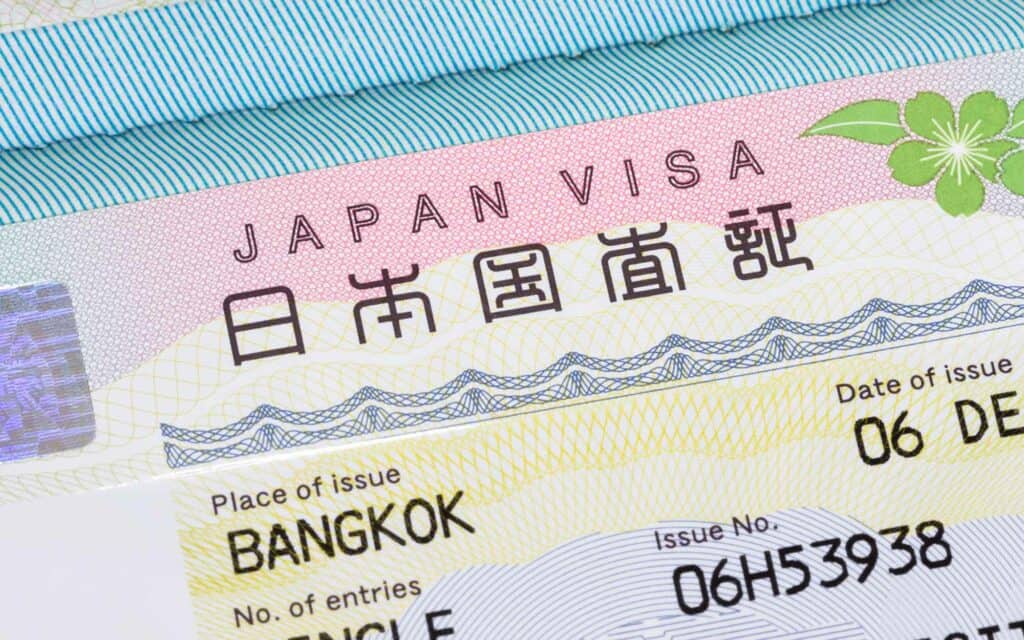
After being completely closed for tourism for more than 2 years, Japan finally reopened on October 11, 2022, restoring the previous visa exemptions and reducing the visa requirements.
Many nationalities are exempt from having to get a visa. Nationals and residents of select countries can obtain an eVisa online and everyone else can visit one of the over 200 embassies and consulates worldwide.
Table of Contents
Visa policy and visa types.
Nationals from 70 countries can travel to Japan visa-free . Most can stay up to 90 days.
Unless exempt, nationals and residents from 11 countries can apply for an eVisa online. They may still have to visit their nearest Japanese embassy. The eVisa allows stays for up to 90 days.
Everyone else must obtain a regular tourist visa from a Japanese overseas mission before traveling.
Japan does not have a visa on arrival.
Below is a summary of available visa types for tourists.
Entry Requirements
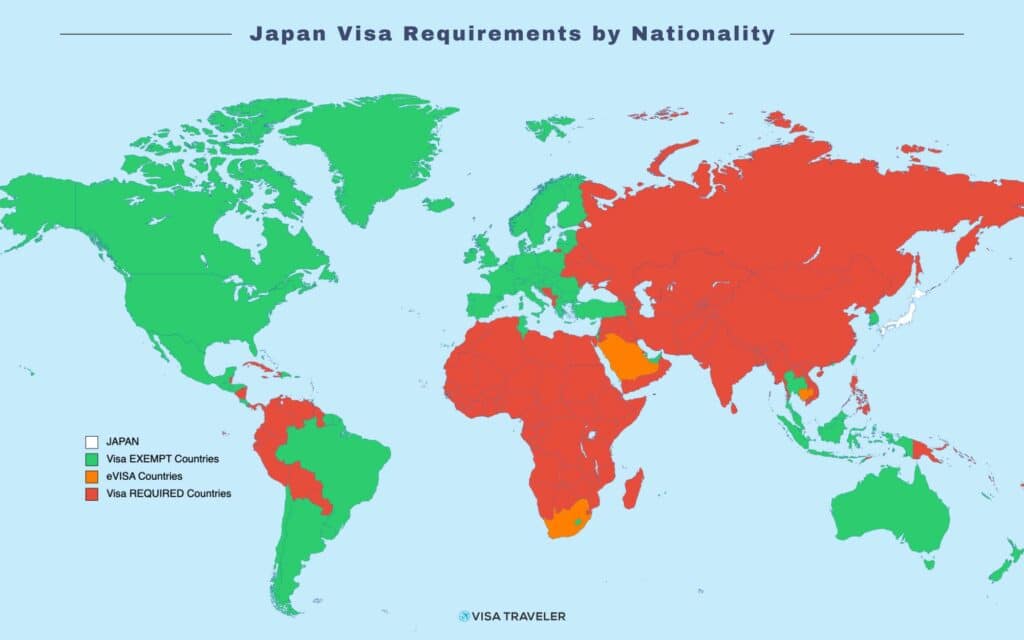
The following requirements apply to all visitors to Japan:
- Passport, which will remain valid during the period of stay
- Proof of sufficient funds to cover the cost of stay
- Return or onward ticket
Border officials rarely ask about the last 2.
For the specific visa requirements, see the corresponding section below.
Visa Exemption
Nationals of 70 countries are visa-exempted to travel to Japan. 65 countries are allowed to stay 90 days and the remaining 5 countries are allowed to say 14 to 30 days depending on the nationality.
There are additional requirements for some nationalities, outlined below. It’s best to check the official Japanese Foreign Ministry website for details.
- Austria (6)
- Barbados (5)
- Czech Republic
- Dominican Republic
- El Salvador
- Germany (6)
- Hong Kong (3)
- Ireland (6)
- Lesotho (5)
- Liechtenstein (6)
- Malaysia (2)
- Netherlands
- New Zealand
- North Macedonia
- South Korea
- Switzerland (6)
- United Kingdom (6)
- United States
- United Arab Emirates (2)
- Indonesia (1)
- Thailand (2)
- Must register an ePassport at a Japanese embassy in the respective country. Registration is valid for 3 years but not longer than the passport’s expiry date.
- Must have an ePassport, otherwise, need a visa.
- Only for passports issued by the corresponding Special Administrative Region.
- Must have a personal ID number.
- Must have a Machine-Readable Passport .
- Eligible to extend their stay to up to 6 months. Applications are made at a Regional Immigration Bureau inside Japan.
Japan eVisa
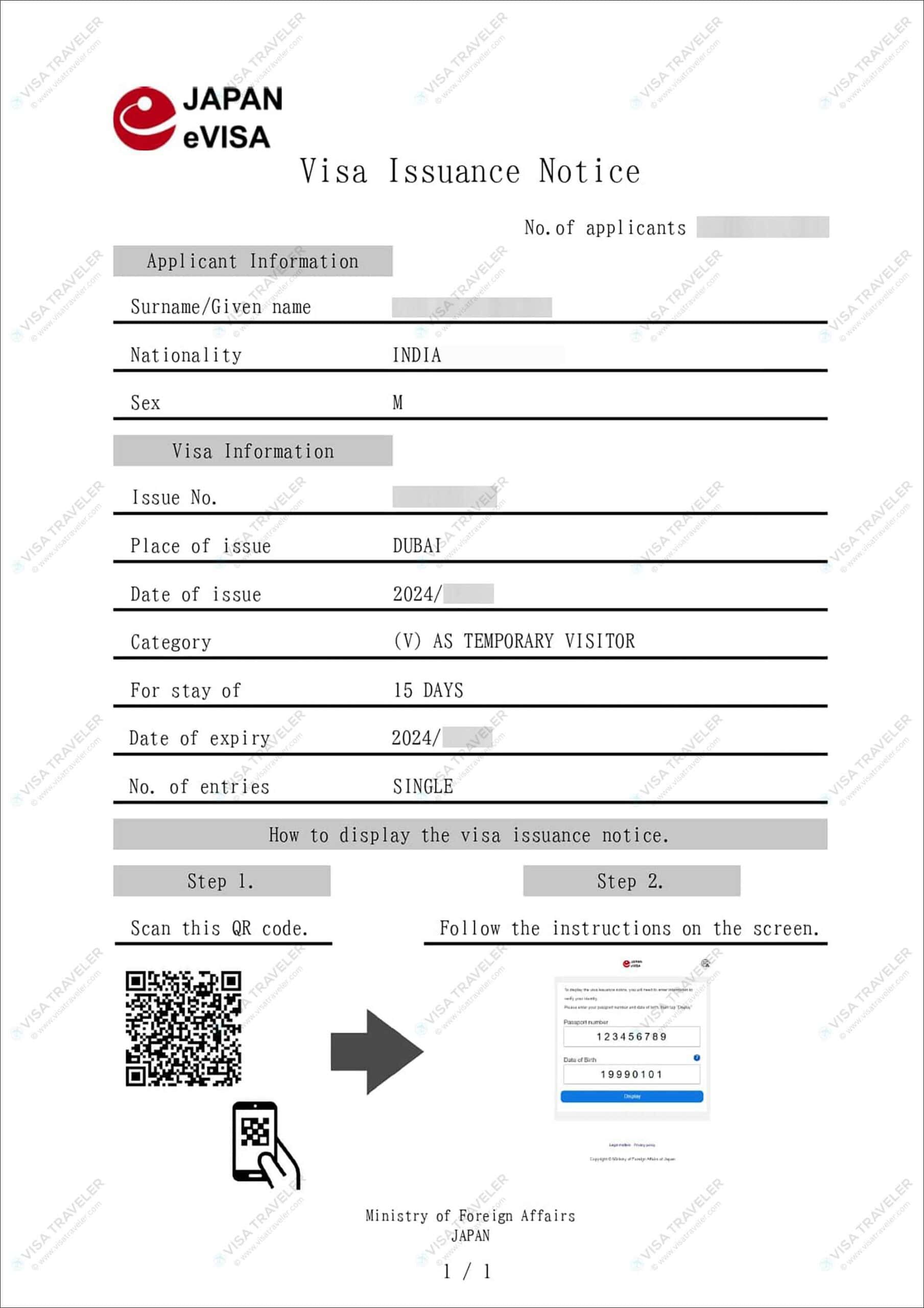
All nationals and residents from below 14 countries are eligible to apply for Japan eVisa. Those already visa-exempt don’t need to apply.
- Saudi Arabia
- South Africa
- United Arab Emirates
- United Kingdom
- Mongolia*
*Required to apply through an agency (see below).
Characteristics
- Only for tourism
- Valid for 3 months, single-entry only
- Duration of stay up to 90 days
- Fee 3,000 JPY or equivalent. Payable online or in person at the embassy. Some nationalities are exempt from the fee (check with your embassy)
- Processing takes 5 days to issue but could sometimes take longer
Documents required
What documents are required depends on your nationality and residence. These are the most commonly asked documents but check on the eVisa portal online for an exact list.
- Passport scan
- Color picture taken within the last 6 months
- Proof of immigration status (e.g. Permanent Residence Card or Visa if applicable )
- Flight itinerary (you don’t have to buy the tickets in advance, an itinerary from an airline is sufficient)
- Recent bank statement
- Travel itinerary (must be specific format, download eVisa travel itinerary template here)
- Proof of current residential address (e.g. driver’s license, state ID, utility bill, or lease agreement)
- Visa for the country you will visit after Japan (unless it’s your own country)
Application procedure
Applying online is incredibly simple. You can check out this video from Japan’s MOFA or follow the steps below.
- Go to Japan eVisa portal
- Register an account
- Fill out the application and upload the necessary documents
- Wait for your documents to be examined. You may be asked to submit additional documents. You will receive an email inviting you to pay when this step is complete.
- Pay online or in person
- After the eVisa has been issued, log in and make sure you can show the “ Visa Issuance Notice ” on your smartphone.
There’s no need to print any documents. On the contrary, you must show the visa on a digital device. Screenshots are not accepted either.
At the border, show the visa issuance notice with the QR code.
Once inside the country, you will receive an email saying your eVisa has expired. Don’t panic. This means you cannot use it to enter Japan again. You are allowed to stay up to 90 days inside Japan.
Applying from China, Vietnam, and Mongolia
Obtaining an eVisa for Japan in these three countries comes with special provisions.
EVisa is available to nationals of China who reside in China (excluding Hong Kong and Macau). You must apply through a Japan Visa Application Center or an accredited travel agency.
The eVisa grants entry to Japan for up to 30 days. Read more about it on the Japanese embassy in China website .
EVisa is available to nationals of Vietnam, who reside in Vietnam. You must book a packaged tour organized by a travel agency.
EVisa is available ONLY to foreign nationals who reside in Mongolia. You must apply at the Japan Visa Application Center (VAC) in Mongolia. Check with the Japanese embassy in Mongolia for more information.
Read the Japan eVisa article for more in-depth information on eVisa requirements, processing times, application process and border procedures.
Japan Tourist Visa
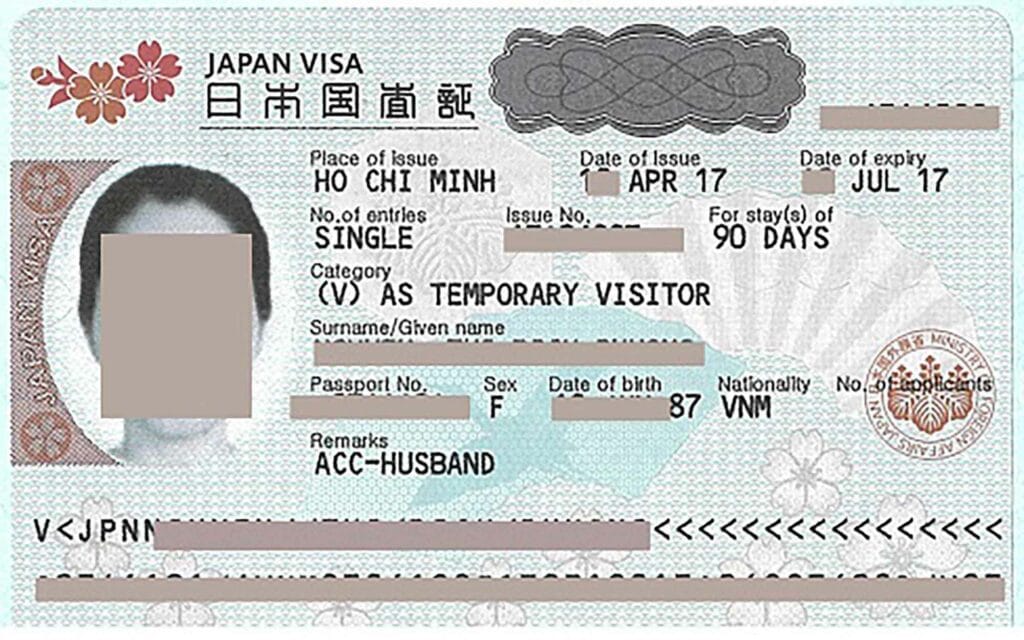
Everyone who’s not visa-exempt must obtain a visa to travel to Japan. If the eVisa isn’t an option, then you must obtain a tourist visa from a Japanese embassy.
Tourist visas are mostly single-entry. The term of stay can be either 15, 30 or 90 days from the date of entry. The visa itself is valid for 3 months for single entry and up to 5 years for multiple entry.
Requirements
The requirements for a tourist visa may differ depending on your nationality and the embassy you apply from. In most cases, they are:
- Passport with at least 2 blank pages
- Completed Visa Application Form
- 1 Passport-sized color photo taken within the last 6 months
- Flight itinerary
- Hotel reservation unless staying in an invitee’s home. It must cover the entire stay in Japan .
- Detailed, day-by-day itinerary in Japan .
- Most recent bank statement
- Proof of immigration status (if applicable)
The visa costs 3,000 JPY (~21$) or equivalent.
For further reading, check out the Japan Tourist Visa article for details such as when to apply, photo requirements and the application process.
Benefits of Japan tourist visa
Japan’s tourist visa is becoming a strong visa these days. That means Japanese visas have added benefits such as VISA-FREE travel to many other countries. As of 2024, you can travel to 14 countries with a Japanese visa. Read the VISA-FREE countries for Japan visa article for more details.
Transiting in Japan
Not leaving the airport.
If you are not already visa-exempt, you can transit in Japan without a visa only if:
- You stay within the international transit area of the airport;
- You have the necessary documents needed for the next country of destination;
- within 72 hours for Tokyo Haneda Airport or Kansai Airport (Osaka);
- within the same calendar day for all other airports.
Transit Visa
If you intend to pass through immigration and enter Japan for a short period, you must obtain a transit visa.
The requirements and procedures for obtaining transit visas are identical to regular tourist visas.
The main differences are in cost and duration of stay. The transit visa costs 700 JPY (~5$) and is issued for a maximum of 15 days but usually just 2-3 days until your next flight.
Japan Shore Pass
If you are transiting in Japan for less than 72 hours and you have a connecting flight that’s NOT on the same day, you may be able to obtain the Japan Shore Pass.
The application for it is usually done by the airline so it’s best to consult them.
To be eligible for the shore pass, you must arrive and depart from airports and seaports within the same group.
- Airports : Narita, Haneda, Nagoya, Niigata, Komatsu, Yokota.
- Seaports : Tokyo, Yokohama, Niigata, Nagoya.
- Airports : Osaka, Nagoya, Komatsu.
- Seaports : Osaka, Kobe, Nagoya.
- Airports : Fukuoka, Nagasaki, Kumamoto, Kagoshima, Naha, Kadena.
- Seaports : Hakata, Shimonoseki, Naha.
- Airports : Chitose.
- Seaports : Tomakomai, Otaru, Hakodate, Muroran.
Entry Procedure at the Airports
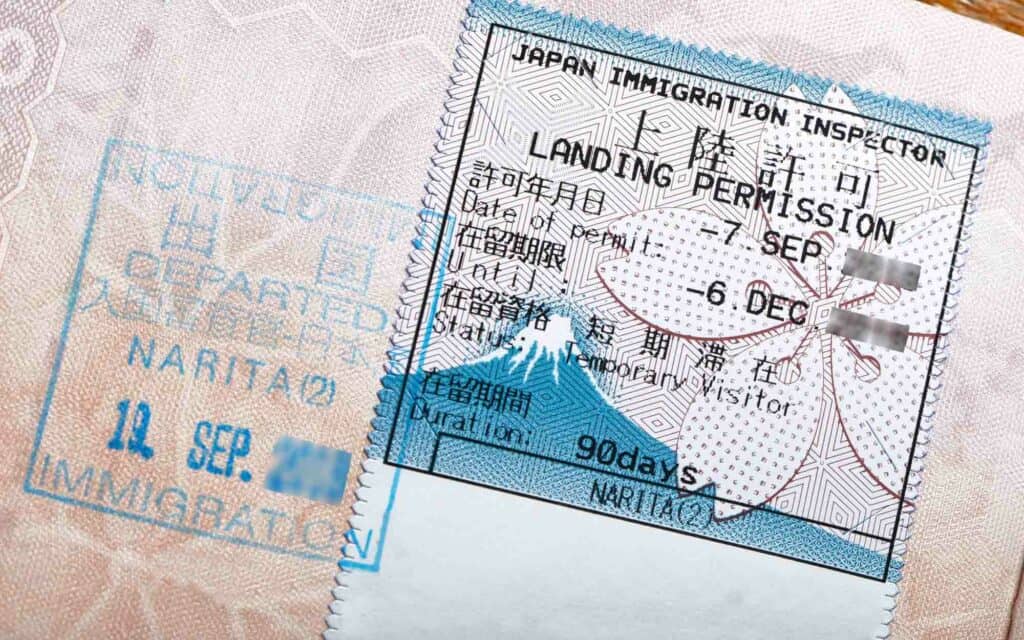
You may use the Visit Japan Web to submit all required information online. It’s not mandatory. Instead of paper forms, you will show QR codes.
After landing, you will sequentially go through immigration and customs.
If you got the eVisa, show your visa issuance notice on a smartphone. Otherwise, just your passport. Get a stamp and enjoy Japan.
Frequently Asked Questions (FAQs)
Is a covid vaccination certificate required to travel to japan.
COVID vaccination certificates and tests are not required since April 29, 2023.
Can I apply for a Japan visa online?
Yes but only if you’re a national or resident of the 11 eligible countries listed above.
How much does a Japan visa cost?
Japan visa costs 3000 YEN or equivalent in another currency.
How long does visa processing take?
Japan visa processing normally takes 5 working days but it could take more. It’s a good idea to apply for a visa at least a month before you travel.
Can I get a multiple-entry visa?
Japan eVisas are single-entry only. Embassies may issue multiple-entry visas depending on your circumstances.
WRITTEN BY THIRUMAL MOTATI

Thirumal Motati is an expert in tourist visa matters. He has been traveling the world on tourist visas for more than a decade. With his expertise, he has obtained several tourist visas, including the most strenuous ones such as the US, UK, Canada, and Schengen, some of which were granted multiple times. He has also set foot inside US consulates on numerous occasions. Mr. Motati has uncovered the secrets to successful visa applications. His guidance has enabled countless individuals to obtain their visas and fulfill their travel dreams. His statements have been mentioned in publications like Yahoo, BBC, The Hindu, and Travel Zoo.
PLAN YOUR TRAVEL WITH VISA TRAVELER
I highly recommend using these websites to plan your trip. I use these websites myself to apply for my visas, book my flights and hotels and purchase my travel insurance.
01. Apply for your visa
Get a verifiable flight itinerary for your visa application from DummyTicket247 . DummyTicket247 is a flight search engine to search and book flight itineraries for visas instantly. These flight itineraries are guaranteed to be valid for 2 weeks and work for all visa applications.
02. Book your fight
Find the cheapest flight tickets using Skyscanner . Skyscanner includes all budget airlines and you are guaranteed to find the cheapest flight to your destination.
03. Book your hotel
Book your hotel from Booking.com . Booking.com has pretty much every hotel, hostel and guesthouse from every destination.
04. Get your onward ticket
If traveling on a one-way ticket, use BestOnwardTicket to get proof of onward ticket for just $12, valid for 48 hours.
05. Purchase your insurance
Purchase travel medical insurance for your trip from SafetyWing . Insurance from SafetyWing covers COVID-19 and also comes with a visa letter which you can use for your visas.
Need more? Check out my travel resources page for the best websites to plan your trip.
LEGAL DISCLAIMER We are not affiliated with immigration, embassies or governments of any country. The content in this article is for educational and general informational purposes only, and shall not be understood or construed as, visa, immigration or legal advice. Your use of information provided in this article is solely at your own risk and you expressly agree not to rely upon any information contained in this article as a substitute for professional visa or immigration advice. Under no circumstance shall be held liable or responsible for any errors or omissions in this article or for any damage you may suffer in respect to any actions taken or not taken based on any or all of the information in this article. Please refer to our full disclaimer for further information.
AFFILIATE DISCLOSURE This post may contain affiliate links, which means we may receive a commission, at no extra cost to you, if you make a purchase through a link. Please refer to our full disclosure for further information.
MORE VISA GUIDES

UNITED KINGDOM

VIEW ALL VISA GUIDES
- Cookie Policy
- Copyright Notice
- Privacy Policy
- Terms of Use
- Flight Itinerary
- Hotel Reservation
- Travel Insurance
- Onward Ticket
- Testimonials
Search this site
Cookies on GOV.UK
We use some essential cookies to make this website work.
We’d like to set additional cookies to understand how you use GOV.UK, remember your settings and improve government services.
We also use cookies set by other sites to help us deliver content from their services.
You have accepted additional cookies. You can change your cookie settings at any time.
You have rejected additional cookies. You can change your cookie settings at any time.
- Passports, travel and living abroad
- Travel abroad
- Foreign travel advice
Entry requirements
This advice reflects the UK government’s understanding of current rules for people travelling on a full ‘British citizen’ passport from the UK, for the most common types of travel.
The authorities in Japan set and enforce entry rules. If you’re not sure how these requirements apply to you, contact the Japanese Embassy in the UK .
COVID-19 rules
There are no COVID-19 testing or vaccination requirements for travellers entering Japan.
Travel in Japan
There are no official COVID-19 restrictions on travel, dining out or other activities. However, the Japanese government still recommends social distancing, mask wearing and other basic precautions. Public compliance with these recommendations is high.
Passport validity requirements
If you’re visiting Japan, your passport must be valid for the length of your stay. No additional period of validity is required.
Check with your travel provider that your passport and other travel documents meet requirements. Renew your passport if you need to.
You will be denied entry if you do not have a valid travel document or try to use a passport that has been reported lost or stolen.
Visa requirements
If you have a ‘British citizen’ passport, you can travel to Japan for tourism or business for up to 90 days. You will get a visa in your passport on arrival, and you do not need to apply before you travel. The Japanese immigration authorities may extend your visa by another 90 days at their discretion. You will need to apply for an extension.
If you have another type of British passport, you must get a visa.
To stay longer (to work or study, for or for other reasons), you must meet the Japanese government’s entry requirements. Check which type of visa or work permit you need with the Japanese Embassy in the UK .
It is illegal to work in Japan without the correct visa however informal or temporary the work.
If you overstay your permission to remain in Japan, you risk arrest, detention and a heavy fine.
For residency information, see the Japanese Immigration Services Agency website and living in Japan .
Vaccination requirements
At least 8 weeks before your trip, check the vaccinations and certificates you need in TravelHealthPro’s Japan guide .
Customs rules
There are strict rules about goods you can take into or out of Japan . You must declare anything that may be prohibited or subject to tax or duty.
It is illegal to bring meat products (including sausages, bacon and ham) to Japan without permission from the Japanese Animal Quarantine Service . Penalties include a heavy fine and prison sentence.
Whale meat is available in Japan but importing it into the UK and EU is illegal. If you import whale meat to the UK, you can get a fine of up to £5,000 and a prison sentence. Customs officers will seize the meat.
Taking money into Japan
People mainly use cash in Japan.
You may have difficulty using credit and debit cards issued outside Japan. Cirrus, Maestro, Link and Delta cash cards are not widely accepted. Japanese post offices, 7-Eleven stores and JP Post Bank have cash machines that will accept some foreign cards during business hours.
Check with your bank before travelling and take alternative sources of money.
Related content
Is this page useful.
- Yes this page is useful
- No this page is not useful
Help us improve GOV.UK
Don’t include personal or financial information like your National Insurance number or credit card details.
To help us improve GOV.UK, we’d like to know more about your visit today. We’ll send you a link to a feedback form. It will take only 2 minutes to fill in. Don’t worry we won’t send you spam or share your email address with anyone.
A Complete Guide To Applying For A Travel Visa To Japan
- Last updated May 01, 2024
- Difficulty Intemediate
- Category Travel

Traveling to Japan can be an unforgettable experience, from the bustling streets of Tokyo to the serene temples of Kyoto. But before you embark on this adventure, there is one essential step you must take: applying for a travel visa to Japan. Whether you're a seasoned traveler or a first-timer, navigating the visa application process can be daunting. That's why we've created this comprehensive guide to help you through every step of the way. From understanding the different types of visas to gathering the necessary documents, we've got you covered. So, let's dive in and get you one step closer to exploring the Land of the Rising Sun!
What You'll Learn
Gather the necessary documents for your travel visa application, research the specific requirements and procedures for applying in your country, complete the visa application form accurately and thoroughly, submit your application and wait for a decision from the japanese embassy.

If you're planning a trip to Japan, you may need to apply for a travel visa before you can enter the country. The application process can vary depending on your nationality, so it's important to research the specific requirements for your country. In this article, we will guide you through the process of gathering the necessary documents for your travel visa application to Japan.
- Valid passport: Your passport is the most important document you'll need for your visa application. Make sure your passport is valid for at least six months beyond your planned departure date from Japan. If your passport is due to expire soon, consider renewing it before applying for your visa.
- Visa application form: You can usually download the visa application form from the website of the Japanese embassy or consulate in your country. Fill out the form completely and accurately, making sure to sign and date it.
- Photo: Attach one recent passport-sized color photograph to your visa application form. The photo should meet the specific requirements outlined by the Japanese embassy or consulate, such as size, background color, and facial expression.
- Itinerary: Prepare a detailed travel itinerary that includes your planned dates of arrival and departure, as well as the places you'll be visiting in Japan. You should also include any reservations you've made for accommodations or transportation within the country.
- Proof of accommodation: Provide proof of your accommodations in Japan, such as hotel reservations or a letter of invitation if you're staying with a friend or family member. Make sure the document includes your name, the address of the accommodation, and the dates of your stay.
- Travel insurance: Obtain travel insurance that covers your entire stay in Japan. The insurance should provide coverage for medical expenses, repatriation, and emergency evacuation. Include a copy of your insurance policy or a letter from the insurance company stating the coverage details.
- Financial documents: You may be required to provide proof of sufficient funds to cover your expenses during your stay in Japan. This can include bank statements, a letter from your employer stating your position and salary, or an international credit card statement.
- Employment verification: If you're employed, include a letter from your employer stating your position, the length of your employment, and permission for your absence during the travel dates specified in your itinerary.
- Flight itinerary: It's recommended to have a confirmed round-trip flight itinerary showing your planned entry and exit dates from Japan. If you haven't booked your flight yet, you can provide a tentative flight itinerary or a booking confirmation for your departure flight.
- Additional documents: Depending on your circumstances, you may need to provide additional documents. For example, if you're a student, you should include a letter from your school or university confirming your enrollment. If you're visiting family or friends, include a letter of invitation from your host. Check the requirements for your specific visa type to see if any additional documents are needed.
Once you've gathered all the necessary documents, double-check that everything is complete and accurate. It's advisable to make copies of all your documents for your records. Finally, submit your completed application and supporting documents to the appropriate Japanese embassy or consulate in your country, following their specific instructions.
Can I Travel Abroad If My Visa is About to Expire?
You may want to see also
Applying for a travel visa to Japan can be a straightforward process if you follow the necessary steps and research the specific requirements and procedures for your country. Here is a detailed guide on how to apply for a travel visa to Japan:
Determine your visa type:
- Temporary Visitor Visa: This visa is suitable for short-term visits such as tourism, sightseeing, or visiting friends and relatives.
- Working Visa: If you plan to work in Japan, you need to apply for a working visa. The specific requirements vary depending on the type of work you will be doing.
- Student Visa: If you plan to study in Japan, you will need to apply for a student visa. The requirements for this visa type include a Certificate of Eligibility issued by your chosen educational institution in Japan.
Research the requirements:
- Visit the official website of the Embassy or Consulate General of Japan in your country. They will provide you with detailed information on the required documents and application procedures.
- Generally, you will need a valid passport, a completed visa application form, a recent passport-sized photograph, and supporting documents such as flight itineraries, hotel reservations, and proof of sufficient funds to cover your stay in Japan.
Prepare your documents:
- Make sure your passport is valid for at least six months beyond your intended stay in Japan.
- Complete the visa application form accurately and legibly. You may need to provide details about your travel history, employment, and purpose of visit.
- Attach the recent passport-sized photograph to the application form as per the specifications mentioned in the guidelines.
- Gather the supporting documents required for your visa type, such as flight itineraries, hotel reservations, a bank statement showing sufficient funds, and any additional documents requested by the embassy.
Submit your application:
- Once you have prepared all the necessary documents, visit the Embassy or Consulate General of Japan in your country. Some countries may require you to make an appointment before submitting your application.
- Take all the original documents, along with copies, as some embassies may ask for both.
- Submit your application form and supporting documents to the designated visa application center or consular office.
Pay the visa fee:
After submitting your application, you will be required to pay the visa fee. The fee may vary depending on your nationality and the type of visa you are applying for. Check the official website or contact the embassy for the exact fee amount and acceptable payment methods.
Attend an interview (if required):
In some cases, the visa application process may include an interview with an immigration officer. The purpose of the interview is to verify the information provided in your application and to assess your intentions to visit Japan.
Track your application:
After submitting your application, you will be given a tracking number or reference number. Use this number to track the progress of your application online or via the embassy's hotline. It is essential to keep yourself updated on the status of your visa application.
Collect your passport:
- Once your visa application has been processed and approved, you will be notified to collect your stamped passport from the embassy or visa application center.
- Make sure to bring the necessary documents and identification when picking up your passport.
Remember to start the visa application process well in advance of your intended travel date to allow sufficient time for processing. Additionally, it is always a good idea to double-check the requirements and procedures specific to your country and the embassy or consulate handling your application. Following these steps will help ensure a smooth and successful application for your travel visa to Japan.
Understanding the Importance of Visa Travel Documents
When applying for a travel visa to Japan, it is crucial to complete the visa application form accurately and thoroughly. The visa application form acts as your primary means of communication with the Japanese Embassy or Consulate, so it is essential to provide accurate and detailed information. Here are some important points to keep in mind when filling out your visa application form:
- Read the instructions carefully: Before starting to fill out the visa application form, take the time to thoroughly read the instructions provided by the Japanese Embassy or Consulate. These instructions will guide you on how to complete the form correctly, what documents are required, and any specific requirements that need to be met.
- Provide accurate personal information: Begin by providing accurate personal information such as your full name, date of birth, gender, and nationality. Make sure all the details are aligned with your passport as any discrepancies may lead to delays or the rejection of your visa application.
- Fill in the required fields: The visa application form will typically have several sections that need to be completed. These sections may include details such as your contact information, passport information, travel itinerary, and purpose of visit. Ensure that you fill in all the required fields and leave no blanks. If a section is not applicable to your situation, clearly indicate so instead of leaving it empty.
- Be clear and specific: When providing details about your travel itinerary, be as clear and specific as possible. Include the dates of your intended entry and departure, as well as the cities or regions you plan to visit. If you have already made any hotel reservations or have an invitation letter from a host in Japan, include these details in the appropriate section.
- Provide accurate employment and financial information: The visa application form may require you to provide information about your current employment or educational background. Be sure to fill in these details accurately, including your job title, employer or institution name, and contact information. Additionally, you may be asked to provide details about your financial situation. Provide accurate information about your income, savings, and any other sources of funding for your trip.
- Answer all required questions truthfully: The visa application form may include questions about your previous travel history, criminal record, or any previous visa rejections. It is crucial to answer these questions truthfully and provide any necessary supporting documents, if required. Providing false information can lead to serious consequences and may result in visa denial or even a future travel ban.
- Double-check before submitting: Before submitting the visa application form, take the time to review all the information you have provided. Double-check for any errors, typos, or missing information. Make sure all the information is accurate, complete, and matches the supporting documents you are submitting.
Completing the visa application form accurately and thoroughly is a crucial step in the process of applying for a travel visa to Japan. Pay close attention to the instructions provided, provide accurate personal and travel information, and make sure to double-check before submitting your application. By following these guidelines, you can increase your chances of a successful visa application.
How to Easily Revise Travel Visa Information for a Seamless Trip
Once you have gathered all the necessary documents and completed the visa application form, it is time to submit your application to the Japanese embassy or consulate in your country. Submitting your application correctly and in a timely manner is crucial to avoid any delays or potential rejections. Here are the steps to submit your application and what to expect during the process:
- Check the Japanese embassy or consulate's website: Before you submit your application, visit the official website of the Japanese embassy or consulate in your country. Familiarize yourself with the specific visa requirements and procedures. It is important to follow the instructions provided on the website to ensure a smooth application process.
- Schedule an appointment (if required): Some Japanese embassies or consulates may require applicants to schedule an appointment before submitting the application. Check the website to see if this is necessary. If appointments are required, make sure to book one in advance to avoid any last-minute inconvenience.
- Gather all the required documents: Double-check that you have all the necessary documents for your visa application. This may include your passport, visa application form, recent passport-sized photographs, flight itinerary, hotel reservations, proof of sufficient financial means, and travel insurance documents. Missing or incomplete documents could result in delays or a rejection of your application.
- Prepare your application package: Organize all your documents neatly and in the required order. Ensure that your visa application form is filled out completely and accurately, sign it, and attach your recent photographs. If there are any additional documents required, such as a letter of invitation or a detailed travel itinerary, include them in your package as well.
- Submit your application: Visit the Japanese embassy or consulate in person on the designated date and time if no appointment is required. If you were asked to schedule an appointment, make sure to arrive on time. Present your application package to the designated authorities. They will review your documents and may ask you questions about your travel plans or intentions. Provide honest and concise answers.
- Pay the visa fee: Depending on your nationality and the type of visa you are applying for, there may be a visa processing fee. Follow the instructions provided on the embassy or consulate's website regarding the fee payment method and amount. Keep in mind that the fee is usually non-refundable, regardless of the outcome of your application.
- Receive the decision: After submitting your visa application, the embassy or consulate will process your application. The processing time can vary depending on the volume of applications received, so it is advisable to apply well in advance of your planned travel date. Once a decision has been made, the embassy or consulate will inform you whether your visa application has been approved or denied.
- Collect your passport and visa: If your application is approved, you will be required to collect your passport from the embassy or consulate. It is important to follow the instructions provided and bring any necessary identification documents or receipts to claim your passport. If your application is denied, the embassy or consulate will provide reasons for the rejection, and you may have the option to appeal the decision or reapply at a later date.
Submitting your visa application to the Japanese embassy or consulate is the last step in the process before you can start looking forward to your trip to Japan. Following the instructions provided, ensuring all the required documents are complete, and being honest and prepared during the application process will significantly increase your chances of obtaining a travel visa to Japan.
De Facto Visa Holders: Can They Travel?
Frequently asked questions.
The documents required for a travel visa to Japan include a completed visa application form, a valid passport with at least six months of validity remaining, a recent passport-size photo, proof of travel arrangements (such as flight tickets), proof of accommodation (such as hotel reservations), and a detailed travel itinerary.
The processing time for a travel visa application for Japan varies depending on the embassy or consulate where you submit your application. Generally, it takes around 5 to 10 business days for the visa to be processed, but it can take longer during peak travel seasons. It is recommended to apply well in advance to allow for any potential delays.
The cost of a travel visa to Japan depends on your nationality and the type of visa you are applying for. Generally, tourist visas have a standard fee of around $25 to $50. However, visa fees can vary, so it is best to check with your nearest Japanese embassy or consulate for the exact cost.
No, you cannot apply for a travel visa to Japan online. You must submit your visa application in person at the nearest Japanese embassy or consulate. Some countries have visa application centers where you can submit your application, while others require you to visit the embassy or consulate directly. It is important to check the specific requirements of your country of residence.

- Lazar Odonnell Author

- Karli Trujillo Author Editor Reviewer
It is awesome. Thank you for your feedback!
We are sorry. Plesae let us know what went wrong?
We will update our content. Thank you for your feedback!
Leave a comment
Travel photos, related posts.

Traveling to Puerto Rico with a US Visa: Everything You Need to Know
- Mar 30, 2024
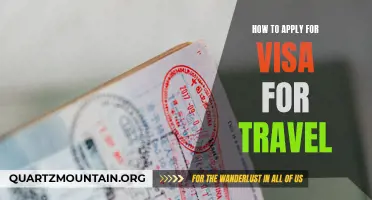
Top Tips for Applying for a Travel Visa
- May 01, 2024

Traveling with an Expired F1 Visa: What You Need to Know
- Mar 23, 2024
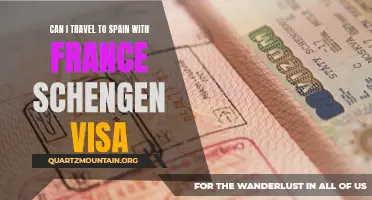
Traveling to Spain with a France Schengen Visa: What You Need to Know
- Mar 22, 2024

A Step-by-Step Guide to Applying for a Canada Visa with a Refugee Travel Document
- Apr 29, 2024
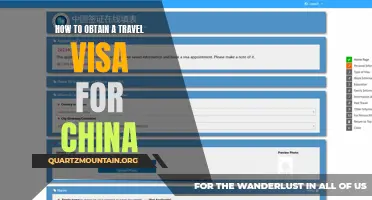
A Step-by-Step Guide to Obtaining a Travel Visa for China
- May 03, 2024

TIPS: What you need to know about getting a Japan visa
Planning to travel to Japan any time soon?
Applying for a visa can be daunting, but it shouldn't stop you from taking that trip to see the Land of the Rising Sun. With some proper preparation of all the necessary documents, you'll be able to get approved for your Japan vacation.
There are different types of Japanese visas but we'll focus more on the tourist ones for those who want to go on a quick leisure trip to experience the country. There are two common tourist visas: the single-entry allowing holders to enter Japan once and stay for as long as 90 days, and the multiple entry visa which lets the holder enter the country many times within a specified period for at least 15 to 30 days each stay. Here are the requirements you'll need to get ready.
- Valid Philippine passport in good condition, must be signed and have at least two blank visa pages
- Visa application form which you can download here
- Your itinerary in Japan which includes your port of entry, where you intend to stay and the contact number of the accommodation
- A passport photo 2 x 1.4 inches with a white background taken within six months
- If your birth certificate is "late registration," you must also submit a Baptismal Certificate and a Form 137 from high school or elementary, both of which must be issued within at least three months
- You only need to submit a birth certificate if you have never applied for a Japan visa before
- You will also need to write a letter of authorization for the Japan Embassy to verify your birth certificate
- Original Marriage Certificate (if married) issued within one year
- Bank Certificate of a personal account (not company/business) issued within three months
- A copy of your latest Income Tax Return
If someone else will be shouldering your travel expenses, you must also submit the following:
- Guarantee letter
- Proof of relationship between applicant and guarantor
- Bank Certificate and Income Tax Return of the guarantor
Once you've acquired all the requirements, choose an accredited travel agency from this list from the Japanese Embassy. Fees may cost P950 to P1,200 for a single entry visa, depending on the travel agency.
Multiple-entry requirements
Want to get a multiple-entry visa? This type of visa has some conditions for issuance, so it may not be as easy to get one. For instance, you will need to have a history of travel as a temporary visitor to the country in the last three years.
If you pass the conditions, you will need the same requirements as above but also include an explanation letter for requesting multiple entry, proof of your travel to Japan in the last three years, and proof of financial capacity.
So how much money do you need in your bank account to get your visa approved? The Japanese Embassy hasn't really specified a certain amount but what's advised is to have enough to fund your travel expenses.
As for how long a tourist visa is processed, it will usually take seven to 10 business days. It's best to get your visa processed a month before your trip so you have ample time to request documents that you might not have around.
Additionally, you don't need to book a hotel or a flight before your visa is processed. In fact, travel agencies advise against it. It's best to book once your visa is approved.
Remember, just because you submitted all your documents, it doesn't automatically mean that you'll be granted the visa.
This article TIPS: What you need to know about getting a Japan visa was originally published in PhilSTAR L!fe

- Foreign Affairs
- Multicultural Community
- Environment & Animals
- Law & Crime
- Health & Science
- Cryptocurrency
- Thoughts of the Times
- Today in History
- Tribune Service
- Blondie & Garfield
- Letter to the Editor
- Travel & Food
- People & Events
- Around Town
- Fortune Telling
- Shows & Dramas
- Theater & Others
- Korean Storytellers

Chinese tourists who disembarked from Dream, a cruise ship that began its journey from Tenjin, China, prepare for tour after arriving at Jeju Port, Jeju Island, April 30. Yonhap
During China's Golden Week holiday, Korea is expected to see a decline in Chinese tourist numbers compared to pre-pandemic levels, travel agents said, as Chinese holidaymakers are increasingly favoring visa-free destinations and neighboring Japan, enticed by a weakened yen.
The shift in tourist preferences presents challenges for Korea's tourism sector as it grapples with the enduring impact of the pandemic, particularly given the significant spending power of Chinese visitors.
A number of Chinese visa agents told The Korea Times that the number of Chinese people applying for Korean visas ahead of the five-day Labor Day holiday, which started on Wednesday, has plummeted compared to levels in 2019 before the pandemic hit in 2020 when China effectively closed its borders to international travel.
Wang Xin, a travel agent with Beijing Tianping International Travel, who specializes in visa services, said the number of people seeking Korean travel visa services has dropped by at least a third compared to levels seen in 2019.
"This year, many Chinese went to Japan instead, thanks to the low exchange rate," Wang said, adding that people seeking Japanese visas with him before the holidays are at least 20 percent higher than levels seen in 2019.
Other Chinese travel agents also expressed similar sentiments, saying that Korea's allure has declined among Chinese tourists, with some saying the number is only a fraction of levels seen before the pandemic.
As the Japanese yen reached a three-decade low against the U.S. dollar, Chinese tourists flocked to Japan, spending generously and propelling it to the status of the most sought-after destination during the Golden Week holiday, as reported by Chinese online travel agencies.
"If many travelers choose Korea primarily for shopping, and with Japan offering more favorable exchange rates, it's logical that this portion of travelers would shift towards Japan. One country's loss is another country's gain," said Zhou Mingqi, founder of tourism consultancy Jingjian Consulting based in China.
Chinese people are also showing a preference for the easier option of traveling to countries that do not require a travel visa, such as Thailand, Malaysia, Singapore, Georgia, and Egypt, among others, as reported by online travel platforms in China.
"Chinese travelers now have more options for their outbound trips. In situations where Korea's relationship with China is not friendly, Chinese tourists can choose to visit other countries," said Zhang Huizhi, a professor of Northeast Asian studies at Jilin University in China's northeastern Jilin Province.
"Additionally, many countries now offer visa-free entry for Chinese citizens, making travel more convenient. Korea, on the other hand, still requires visa applications and other procedures, lacking competitiveness in terms of convenience."
Tourism in Korea, on the other hand, is also trying to get back on its feet after three years of the coronavirus pandemic that ended almost all international travel.
According to the Ministry of Culture, Sports and Tourism, the number of international tourist arrivals recovered to 63 percent of pre-pandemic levels at around 11 million in 2023, compared to 17.5 million international inbound visitors in 2019.
Approximately 2.1 million inbound visitors came to Korea from China, which only removed its severe international travel restrictions in December 2022. That was about 33 percent of its 2019 levels.
In 2019, more than 400,000 travelers from China visited Korea each month, with a peak of 578, 112 Chinese visitors in August, according to the Korea Tourism Organization (KTO).
However, in March, the latest data available, 391,347 Chinese visitors traveled to Korea, significantly less than pre-pandemic levels.
In 2019, more than one in three foreign visitors to Korea were from China, according to the KTO, while the ratio dropped to one in five from 2023 to March 2024.
In China, the five-day Labor Day holiday serves as a crucial barometer for consumption and tourism. Major airports across the country anticipate notable surges in both domestic and international travel during this period.
According to data from Tongcheng Travel, Bangkok, Kuala Lumpur, Tokyo, Phuket, Singapore, Osaka, Seoul, Dubai, Ho Chi Minh City and Chiang Mai are the most popular outbound travel destinations for the May Day holiday among Chinese tourists.
Luna Sun is an economy reporter with the South China Morning Post. She is currently based in Seoul, reporting for both The Korea Times and the South China Morning Post via an exchange program.

World Water Day 2024
Busan World Team Table Tennis Championships Finals
Super Bowl 2024
Welcoming Lunar New Year around world
Daily life in Afghanistan under Taliban rule
We use cookies on this site to enhance your user experience. If you continue to browse you accept the use of cookies on our site. See our Cookie Policy for more information.
- Media & Industry
- Meetings & Events
- Select Language 简体中文 繁體中文(香港) 繁體中文(臺灣) India (English) Bahasa Indonesia 한국어 ภาษาไทย Tiếng Việt Singapore (English) Philippines (English) Malaysia (English) Australia/New Zealand (English) Français Deutsch Italiano Español United Kingdom (English) Nordic countries(English) Canada (English) Canada (Français) United States (English) Mexico (español) Português العربية Japan(日本語) Global (English)
- India (English)
- Bahasa Indonesia
- Singapore (English)
- Philippines (English)
- Malaysia (English)
- Australia/New Zealand (English)
- United Kingdom (English)
- Nordic countries(English)
- Canada (English)
- Canada (Français)
- United States (English)
- Mexico (español)
- Global (English)
- Fujiyoshida
- Shimonoseki
- Ishigaki Island
- Miyako Island
- Kerama Island
- Tokyo Island
- Koka & Shigaraki
- Hida Takayama
- Ginza, Nihonbashi
- Beppu & Yufuin (Onsen)
- Ginzan Onsen
- Nagasaki Islands

- Kumano Kodo
- Shikoku Karst
- Amami Oshima
- Hachimantai
- Omihachiman
- Aizuwakamatsu

- Diving in Japan
- Skiing in Japan
- Seasonal Flowers in Japan
- Sustainable Outdoors
- Off the Beaten Track in Japan
- Scenic Spots
- World Heritage
- Home Stays & Farm Stays

- Japanese Gardens
- Japanese Crafts
- Temple Stays
- Heritage Stays
- Festivals and Events
- Theater in Japan
- Japanese Tea Ceremony
- Cultural Experiences in Japan
- Culture in Japan

- Local Cuisine Eastern Japan
- Local Cuisine Western Japan
- Local Street Food
- Japanese Whisky
- Vegetarian and Vegan Guide
- Sushi in Japan Guide
- Japanese Sake Breweries

- Art Museums
- Architecture
- Performing Arts
- Art Festivals
- Japanese Anime and Comics
- Japanese Ceramics
- Local Crafts

- Scenic Night Views
- Natural Wonders
- Theme Parks
- Samurai & Ninja
- Iconic Architecture

- Wellness Travel in Japan
- Japanese Ryokan Guide
- A Guide to Stargazing in Japan
- Relaxation in Japan
- Forest Bathing (Shinrin-yoku)

- Experiences in Japan
- Enjoy my Japan
- National Parks
- Japan's Local Treasures
- Japan Heritage
- Snow Like No Other
- Wonder Around Japan

Visa Information
- Getting to Japan
- Airport Access
- COVID-19: Practical Information for Traveling to Japan
- Anime Tourism
- Countryside Stays
- Accessible Tourism
- Hokkaido Great Outdoors
- Scenic World Heritage in Tohoku
- Shikoku’s Nature and Traditions
- Southern Kyushu by Rail

- Traveling by Rail
- How to Travel by Train and Bus
- JR Rail Passes
- Scenic Railways
- Renting a Car
- Sustainable Travel in Japan
- Travel Brochures
- Useful Apps
- Online Reservation Sites
- Eco-friendly Accommodation
- Luxury Accommodations
- Traveling With a Disability
- Hands-free Travel
- How to Book a Certified Tour Guide
- Volunteer Guides
- Tourist Information Center

- Japanese Manners
- Spring in Japan
- Summer in Japan
- Autumn in Japan
- Winter in Japan
- Cherry Blossom Forecast
- Autumn Leaves Forecast

- Japan Visitor Hotline
- Travel Insurance in Japan
- Japan Safe Travel Information
- Accessibility in Japan
- Vegetarian Guide
- Muslim Travelers
- Safety Tips

My Favorites
${v.desc | trunc(25)}
Planning a Trip to Japan?
Share your travel photos with us by hashtagging your images with #visitjapanjp
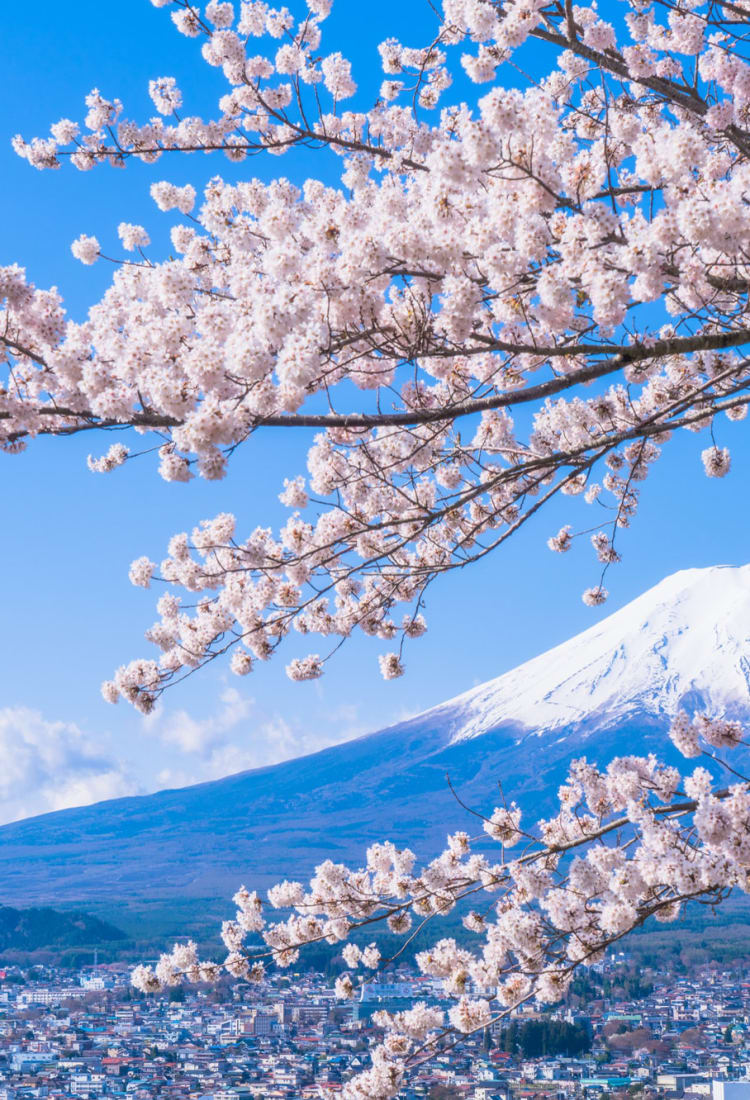
About Japanese visa
Indian nationals require visa when entering Japan. Please see the link below for further information regarding visa.
Please Choose Your Language
Browse the JNTO site in one of multiple languages

IMAGES
VIDEO
COMMENTS
Find out if you need a visa to enter Japan for short-term or long-term stay, and how to apply online or at the embassy or consulate. Check the visa requirements, procedures, fees, documents, FAQs and announcements for your nationality and purpose of visit.
Find out if you need a visa to visit Japan, how to apply, and what documents to prepare. Learn about visa fees, processing time, border measures, and travel guidelines for COVID-19.
Learn how to apply for an electronic visa (eVISA) to travel to Japan for tourism for up to 90 days. Check the eligibility, types of visa, application process, and contact information for inquiries.
Learn how to enter, leave and stay in Japan with a valid passport and the conditions of your visa. Find out the current visa requirements for Japan and the eligibility for visa exemption based on your country of residence.
Learn how to travel to Japan without a visa for up to three months as a U.S. citizen tourist. Find out the latest information on COVID-19, customs, prohibited substances, and other travel requirements from the U.S. Embassy and consulates in Japan.
Learn about visa requirements, registration, and work restrictions for U.S. citizens traveling to Japan. Find useful links and information on visa types, application procedures, and immigration rules.
Learn how to apply for a Japan Tourist Visa, who needs it, what documents to prepare, and how long it takes. Find out the visa fee, duration, extension, and work options for tourists visiting Japan.
JAPAN eVISA is a system that allows you to apply for a single-entry short-term stay visa for tourism online and issue an electronic visa. You can check your eligibility, visa fee, and required documents on the Ministry of Foreign Affairs of Japan website.
Visa Overview. JAPAN VISA INFORMATION HOTLINE (24 hours / 7 days a week, English only) - 1-888-704-4459 (From U.S.A.) - 1-787-296-8046 (From Puerto Rico) * This hotline is designated for visa applicants residing in the U.S.A or Puerto Rico. * If you are calling from the U.S.A or Puerto Rico, you will be charged a domestic call fee for your call.
Temporary Visitor Visa. Most visitors to Japan can enter the country on a temporary visitor visa, or tourist visa, thanks to visa exemption agreements between Japan and many foreign countries. For residents of over 60 countries (a full list can be found here ), a fee-free 90-day visa is issued upon arrival. This requires no advance paperwork ...
Studying in Japan Foreigners who wish to study in Japan (except for short term studies at language schools) need to get a student visa at a Japanese embassy or consulate outside of Japan in order to enter the country on a status of residence that permits long term studies.. Sponsorship from an educational institution in Japan and proof of sufficient funds to cover all your expenses during your ...
Japan: the Official Guide. Japan National Tourism Organization. General tourism information of Japan in multi languages. Climate, Healthcare, Money, Visa, Emergency ...
Foreign visitors who need a visa to travel to Japan must meet the following Japan tourist visa requirements. A valid passport with at least 6 months validity and 2 blank pages. A completed and signed visa application form. A recent photograph, size 4.5 x 4.5 cm, in color and with a white background. An official birth certificate or a certified ...
Call us in Washington, D.C. at 1-888-407-4747 (toll-free in the United States and Canada) or 1-202-501-4444 (from all other countries) from 8:00 a.m. to 8:00 p.m., Eastern Standard Time, Monday through Friday (except U.S. federal holidays). See the State Department's travel website for the Worldwide Caution and Travel Advisories.
A Japan tourist visa is a short-term stay visa for the purposes of sightseeing, visiting friends, or attending conferences or courses. A tourist visa is typically valid for a single-entry stay of up to 90 days. Tourists can also apply for a double-entry visa for 2 short trips within 6 months.
Japan's tourist visa is becoming a strong visa these days. That means Japanese visas have added benefits such as VISA-FREE travel to many other countries. As of 2024, you can travel to 14 countries with a Japanese visa. Read the VISA-FREE countries for Japan visa article for more details. ***
Visa requirements. If you have a 'British citizen' passport, you can travel to Japan for tourism or business for up to 90 days. You will get a visa in your passport on arrival, and you do not ...
The cost of a travel visa to Japan depends on your nationality and the type of visa you are applying for. Generally, tourist visas have a standard fee of around $25 to $50. However, visa fees can vary, so it is best to check with your nearest Japanese embassy or consulate for the exact cost.
There are two common tourist visas: the single-entry allowing holders to enter Japan once and stay for as long as 90 days, and the multiple entry visa which lets the holder enter the country many ...
Currently, all foreign nationals who wish to newly enter Japan need to apply for a visa except for re-entry cases. Meanwhile, the visa exemption measures for passport holders of countries/regions eligible to visa exemption will be resumed from 0:00 am (JST) on October 11, 2022. [For entrants until October 10, 2022]
80 likes, 2 comments - travel_with_ca_saab on May 5, 2024: "#japan #travel #visa #reel #viral #short #shorts #viralvideos #travelling #ca #casumitsharma #casumit #life #enjoy #plane #aeroplane #view #nature #viral #instareels #fbreels Beautiful Sunset in Japan ".
How to Apply for Japan Tourist Visa. Below is a step-by-step guide on how to apply for a Japanese Tourist Visa. Note: The Japan National Tourism Organization (JNTO) cannot facilitate Visa applications nor can we answer Visa-related inquiries. For Visa-related inquiries, kindly contact the Japanese Embassy in the Philippines.
Wang Xin, a travel agent with Beijing Tianping International Travel, who specializes in visa services, said the number of people seeking Korean travel visa services has dropped by at least a third ...
Meanwhile, the TNG eWallet Visa Prepaid card continues to offer 0% markup for foreign currency exchange. Despite the 1% FX markup for Alipay+, the rates could be cheaper than TNG Visa as both Alipay+ and Visa have their respective foreign exchange rates. Things to note before you travel Collect vouchers via A+ Rewards in TNG eWallet
About Japanese visa. Indian nationals require visa when entering Japan. Please see the link below for further information regarding visa. Embassy of Japan in India. Know about VISA Information and related requirements for Indians. JNTO provides you the details of VISA to help you have the best experience on your Japan trip.
Download a PDF document of the visa application form to enter Japan from the official website of the Ministry of Foreign Affairs of Japan. The form requires personal and travel information, such as name, date of birth, nationality, passport type, purpose of visit, and criminal history.
According to its Ministry of Culture, Sports and Tourism, international tourist arrivals recovered to 63 per cent of pre-pandemic levels in 2023, at around 11 million, compared with 17.5 million ...